|
TABLE OF CONTENTS
THE SAYINGS OF CONFUCIUS
ANCIENT WISDOM: CONTEMPORARY PEACE AND HARMONY
AS INTERPRETED by John WorldPeace
Copyright 1998 by John WorldPeace Houston, Texas USA
All rights reserved.
To World Peace; "the possible dream"
TABLE OF CONTENTS
Preface
Book 1
Book 2
Book 3
Book 4
Book 5
Book 6
Book 7
Book 8
Book 9
Book 10
Book 11
Book 12
Book 13
Book 14
Book 15
Book 16
Book 17
Book 18
Book 19
Book 20
PREFACE
Confucius lived about 2500 years ago in China. His Analects or sayings, have
been repeatedly translated over the last 25 centuries because they embody
ideas that transcend time and apply to human behavior in all societies.
The sayings of Confucius cannot be considered a religion in the strictest
sense but are more of a philosophy for peaceful and harmonious living within
society. The emphasis is on social interactions as opposed to the worship
of God.
Overall, Confucius tries to define how a good person should behave in society.
Personally, I do not like to use the term "good person" because it indicates
that some people are bad or evil.
I personally believe that making distinctions of good and bad tend to empower
righteousness and righteousness promotes judgment; the cause of conflict
and war. If we are to foster peace within ourselves and peace among ourselves,
we must see ourselves as one with each other and refuse to judge each
other.
Peace and harmony are neutral words that are essentially free of judgment.
So if I were to say, "a good person does not steal", it indicates the
righteousness of that person. But if I say, "a person who flows in peace
and harmony does not steal", it indicates a non-judgmental state of
peace and harmony within that person.
Therefore, in this book in place of the word good, I have for the most part
used the words peace and harmony; peace in truth being a function of harmony.
In other words, if a person is in harmony with other people, she will tend
to be at peace with herself and at peace with others.
The goal of any translation is to not only, as concisely as possible, convey
thoughts from one language to another but to also make the translation as
readable and understandable as possible.
Scholars tend to use words that are precise even though they are sometimes
archaic. I am not a scholar and I did not actually translate the saying of
Confucius from the original Chinese pictographs. What I did was to try to
find a consensus among several translations. Therefore, what I have written
is more of an interpretation than a translation.
Further, I have not seen fit to interpret the most mundane sayings or the
ones I considered inapplicable to contemporary society.
My goal was to write a book that promotes peace and harmony in contemporary
society as opposed to a literal translation of something that was written
2500 years ago. In essence, I have striven to bring the sayings of Confucius
into the Third Millennium.
In reading this book, it is important to keep in mind that this is my personal
perspective of the sayings of Confucius and is not meant to demean in any
way his sayings or to confront those who feel connected with other translations
of the Analects. My only objective was and is to
attempt to help manifest a higher level of peace and harmony on our planet.
BOOK 1
1. The teacher said,
"To learn something and then to utilize it gives one a harmonious sense of
attainment. To have friends come from far away to visit is uplifting. To
be indifferent to recognition by others of one's talents is a keystone to
a life of peace and harmony."
2. Yu Tzu said,
"A person's character tends to be consistent in his encounters with others.
If one is in harmony with her family, she will generally be in harmony with
her employer. If she is in harmony with her employer, she will generally
be harmony with society. If a person concentrates on achieving harmony as
the root of her life and that root is firmly planted, then the harmony
surrounding her will increase. Peace and harmony within the family
is surely the root of peace and
harmony in society."
3. The teacher said,
"Manipulating words and a well-to-do appearance are seldom the
bearers of peace and harmony."
4. Tseng Tzu said,
"At the end of everyday, I ask myself three questions.
1) In my acts for others, have I been worthy of their trust?
2) Have I been true to my word?
3) Have I practiced what I taught?
5. The teacher said,
"When administering the affairs of a great nation, take care of official
business, do not betray the trust of the people, do not manifest a need for
unnecessary taxes by overspending and do not draft the farmers into the military
between planting and harvest."
6. The teacher said,
"A young girl should be considerate of her parents at home and polite to
her elders in general; seldom make promises, but honor those she makes; be
receptive and empathetic to all people but become intimate only with those
that have demonstrated that they merit her trust; and at all times seek to
manifest peace and harmony."
7. Tzu-hsia said,
"If one values men and women of peace, provides for his parents as they have
provided for him, fulfills his obligation to his nation, is worthy of the
trust of his friends; even though he may not have formal schooling, he is
indeed educated."
8. The teacher said,
"If a person does not carry herself with an air of dignity and self respect,
she will not receive the allegiance and admiration of others. People
who educate themselves by whatever means tend to increase their tolerance
of others and become more flexible in their attitudes. They value loyalty
and trustworthiness in themselves and in others and theymake sure that those
whom they count as friends are in harmony with them. When they make
a mistake, they do not hesitate to admit it and they endeavor to correct
it."
9. The teacher said,
"When your parents die, conduct their funeral with due respect and care,
remembering that you are the progeny of endless generations and remembering
that you too are mortal. If this is done, you will be reminded of your oneness
with all people and a sense of peace and harmony will
permeate society."
10. Tseng Tzu said,
"When the accomplished diplomat visits a nation she always acquires a knowledge
of that nation.
Does she ask questions or do the citizens of that nation instruct her? She
is friendly, cordial, courteous, respectful, polite and through these qualities
she comes to know about the nation. Certainly this is different from the
way most people acquire knowledge."
11. The teacher said,
"Make note of a man's aspirations while his father is alive. Then observe
his behavior after his father dies. If after three years, he has not changed
his father's methods of handling affairs, it can be said that he was in harmony
with his father."
12. Yu Tzu said,
"In honoring traditions, harmony is the objective that is valued. In ancient
times, harmony was regarded as beauty and was desired in all matters great
and small. However, it was seldom achieved. Even though one understands harmony;
rituals and traditions are sometimes needed in order to manifest the harmony
one desires."
13. Yu Tzu said,
"Be in harmony with your promises and you will be able to fulfill them. In
your interactions with people, be in harmony with their customs and traditions
and you will avoid embarrassment and criticism. In marriage, if you find
someone who is in harmony with your family as well as yourself, you will
acquire the respect and admiration of the family and consequently become
a beacon to them."
14. The teacher said
"People in harmony do not eat until they are full and do not strive for total
comfort at home. They are diligent in performing their duties and fulfilling
their responsibilities but are reserved in communicating their thoughts.
They seek to associate themselves with others who flow in peace
and harmony in order to remain centered in peace and harmony. Such people
are open to learning."
15. Tzu-kung said,
"Poor without succumbing to an attitude of subservience, rich without being
arrogant."
The teacher said,
"Poor and flowing in the peace and harmony of simplicity, rich and flowing
in the peace and harmony of traditions and rituals"
Tzu-kung then said,
"Cutting, chiselling, filing, polishing one's life, acquiring and maintaining
peace and harmony, is the nature of life. And what you have said is an
example."
16. The teacher said,
"You should be indifferent to the possibility that others do not recognize
or appreciate your abilities. But on the other hand, you should be concerned
that you may not recognize or appreciate the abilities of others."
BOOK 2
1. The teacher said,
"Those who flow in the harmony of the oneness of humanity are like the North
Star around which all the other stars orbit in peace and harmony."
2. The teacher said,
"The sum of my teachings comes down to this: Live in harmony with yourself
and be at peace with all of humanity."
3. The teacher said,
"If you attempt to control the citizenry by an over abundance of laws
enforced by punishments, the people will circumvent the laws without any
sense of guilt. If you remember the oneness of the citizenry and keep the
laws basic and in harmony with proven traditions and rituals, the people
will flow in harmony and think twice before breaking the law."
4. The teacher said,
"At fifteen, I set my heart on understanding my place in the Universe.
At thirty, I had laid the foundation of my philosophies. At forty, I found
peace. At fifty, I truly understood the oneness of humanity. At sixty, I
listened and was receptive to the harmony of perpetual change. At
seventy, I did as I pleased and yet all that I did was in peace and harmony
with all people."
5. When asked about the treatment of parents, the teacher said,
"In harmony with tradition, to the extent that you can, see that they
are provided for. At the time of their death, observe the traditions of
burial and the final rituals. Always remember that you are the progeny of
endless generations."
6. The teacher said,
"Conduct yourself in such a manner that the only anxiety that your
parents have regarding you is in relation to any illness that you may
acquire."
7. The teacher said,
"If one lacks respect for her parents, then providing for them is like
providing for one's animals."
8. The teacher said,
"Respecting one's parents amounts to more than taking care of their
chores and providing them with food and drink. It is the intent to show
respect through those acts that is essential."
9. The teacher said regarding Yen Hui,
"I can talk to him all day and he asks no questions, so I wonder if he is
listening. However, later when I happen to observe him, I see that he is
practicing what I have taught. It is then that I realize that he not only
was
listening but also that he understood."
10. The teacher said,
"A person cannot hide his true character. Simply observe the way he
accomplishes his tasks and the path he takes. Consider whether there is
harmony between the things he says and the things he does."
11. The teacher said,
"A person who can see the old traditions and rituals perpetually
manifesting in what is considered new is qualified to be a teacher."
12. The teacher said,
"A human being is not a tool with a limited purpose."
13. The teacher said,
"It is best to practice what one preaches."
14. The teacher said,
"A person at one with humanity can see things from many
perspectives. A person who has forgotten his oneness is confused and can
only see things from one perspective; his."
15. The teacher said,
"If one mindlessly learns from others but does not consider the
validity of what he has learned, he will become confused. If one studies
but
does not consider the experiences of others, his life will flow in endless
difficulties and hardships."
16. The teacher said,
"If one is out of harmony with others, peace will be hard to attain."
17. The teacher said,
"True knowledge is embodied in realizing when you truly know
something and realizing when you are confused."
18. The teacher said,
"If you doubt the majority of what you hear and are cautious about
repeating the rest, you will seldom be ridiculed. If you avoid perilous
acts
and act in harmony with your nature, you will have few regrets. If you are
seldom blamed for your words and have few regrets about your actions,
your life will flow in peace and harmony."
19. The teacher said,
"In order to increase the peace and harmony in society, appoint the
honest and empathetic to office. When the dishonest and arrogant hold
office, the people become contentious and rebellious."
20. The teacher said,
"In governing, to obtain respect, foster loyalty and instill optimism,
do the following: In all your words and deeds, treat others with dignity
and
you will obtain their respect. Be respectful to your parents and nurturing
toward your children and you will foster loyalty. Promote the honest and
train the unskilled and the people will become optimistic."
21. When asked why he did not participate in government, the teacher
said,
"I am respectful to my parents, nurturing to my children and in
harmony with my brothers and sisters. This is the root of government even
though it is not generally recognized as such."
22. The teacher said,
"I do not know how a person who is untrustworthy can be put to use. If
an automobile has no steering wheel, how can its direction be determined."
23. When asked whether the nature of government two hundred years into
the future could be determined, the teacher said,
"Each generation builds on the foundation of the past. By studying
history, we can see what each generation has added and what it has
discarded. Therefore, we can generally determine what the future will
manifest."
24. The teacher said,
"To pay homage to gods that are not in harmony with one's nature is to
manipulate the followers of those gods. To have an opportunity to stand up
for what is true and not do so is confusion in cowardice."
BOOK 3
1. The teacher said,
"Rituals and traditions are irrelevant to one who has no interest in
peace and harmony. And further, one who does not value harmony can have
little interest in music."
2. The teacher said,
"In observing rituals and traditions, it is better to be frugal than
extravagant. In mourning it is better to be sad than to be meticulous in
the arrangements."
3. The teacher said,
"Democracy is generally preferable to autocracies and monarchies."
4. The teacher said,
"People who remember their oneness with each other and flow in peace
and harmony do not contend with each other.
Only in competitions of the mind and body could they be considered as
being contentious. However, in competition there is mutual respect. Prize
fighters bear no anger toward their opponents."
5. When asked for an explanation of ritual sacrifice, the teacher said.
"I do not know."
6. The old adage, Meditate as if present, means, meditate as if the
spirits were present.
The teacher said,
"If I do not meditate it is as if the spirits do not exist."
7. The teacher was asked the meaning of the saying;
Better to meditate at the kitchen stove
than at the shrine.
The teacher said,
"It is not true. Whoever is out of harmony with the oneness of
humanity has nowhere to find peace."
8. When the teacher entered the Grand Temple, he asked questions about
everything.
Someone said,
"Do not tell me this teacher understands the rituals. If he did, why
would he ask so many questions?"
The teacher responded,
"Asking questions is the ritual."
9. The teacher said,
"In archery, piercing the target is not the objective because
strength varies from archer to archer."
10. Tzu-kung wanted to stop sacrificing a sheep at the new moon ritual.
The teacher said,
"Tzu-kung, you want to get rid of the sacrificial part of the ritual. I
want to get rid of that ritual altogether."
11. The teacher said,
"If anyone serves his leader to the letter in every act and ritual, he
is considered a lackey."
12. Duke Ting asked the teacher how a ruler should manage his ministers
and how the ministers should relate to their ruler.
The teacher said,
"In employing ministers, one should follow customs and traditions and
appoint those who are in harmony with the ruler.
Ministers should be in harmony with the ruler; loyal and committed to
his policies."
13. The teacher said,
"It is best not to carry pleasure to the limits of drunkenness and not
to carry grief to the limits of self injury."
14. It is said that in constructing an altar to the earth, the Hsia
monarchy used pine, the Yin used cypress and the Chou used chestnut all
claiming that it would make the people fearful.
When the teacher heard this, he said,
"What is over and done, do not argue about. What has taken its
course, do not complain about. What has past, do not criticize."
15. The teacher said,
"Kuan Chung was a man of limited abilities"
Someone said,
"But wasn't he an example of frugality.
The teacher said,
"Kuan Chung has three separate homes, wives and families and he
didn't take care of his official duties. How could he be considered frugal?
Someone else said,
"But surely he understood the rituals"
The teacher said,
"When the ruler built a fence around the royal estate, Kuan Chung
built a fence around his property. When the ruler met with another ruler
he
provided a stand for inverted cups. Kuan Chung also had such a stand. If
this is considered understanding the rituals, who does not understand
them?"
16. The teacher talked about the music of Lu with the Grand Master. He
said,
"The music started in unison, was harmonious, clear and unbroken to
the end."
17. The border guardian at Yi requested an audience with the teacher
saying,
"I have never been denied an audience by any teacher who has come
this way."
The followers of the teacher presented the guardian to the teacher.
When the guardian came out, he said to the followers,
"What are you concerned about? It has been a long time since harmony
prevailed in the nation and the Infinite is about to use your teacher as
a
wooden bell for peace.
18. The teacher commented on two plays; the Shao about the peaceful
enthronement of a ruler and the Wu about the enthronement of a ruler after
a war. He said,
"The Shao is beautiful, harmonious and peaceful. The Wu is beautiful,
harmonious and disturbing."
19. The teacher said,
"If people in positions of authority are narrow minded in their views,
irreverent when performing rituals and without sorrow in mourning, how can
they manifest peace and harmony in the nation?"
BOOK 4
1. The teacher said,
"Peace and harmony give a neighborhood its beauty. A wise person
when given the choice will always choose to live in peace and harmony."
2. The teacher said,
"One who resides in peace and harmony can long endure adversity as
easily as prosperity. A person who feels at one with peace and harmony is
at home in peace and harmony because it is her nature. A wise person
gravitates to peace and harmony because she knows it is advantageous to
do so."
3. The teacher said,
"Only a person who is in harmony with the oneness of humanity can
deal with friendly people as well as disagreeable people."
4. The teacher said,
"A person who flows in the peace and harmony of the oneness of
humanity is tolerant of all people."
5. The teacher said,
"Wealth and status are what most people prefer, but if they are not in
harmony with wealth and status they will not acquire or maintain either.
Poverty and low status is what most people desire to avoid. People
do not reside in poverty and low status if they are not in harmony with
them.
If a person forgets his oneness with humanity, he will find it
difficult to achieve peace and harmony in his life. A person who truly
resides in peace and harmony never forgets her oneness with humanity for
even a moment.
People who remember their oneness with humanity flow in peace and
harmony whether they are at rest or whether they are surrounded by
turmoil."
6. The teacher said,
"I have never met anyone who was totally committed to a peaceful and
harmonious life. Nor have I met anyone who was totally committed to
avoiding turmoil and contention.
A person who is totally committed to peace and harmony could not be
surpassed as an example of the oneness of all humanity. Anyone who was
committed to avoiding turmoil and contention also could not be surpassed
as an example of the oneness of all of humanity.
Is there anyone capable of completely devoting himself to peace and
harmony?
I have never met anyone who does not have the capability of living in
peace and harmony. These people may in fact exist but I have never met one
of them."
7. The teacher said,
"People fail to achieve peace and harmony in all the areas of their
lives because they deal with the majority of things in the same way. If one
observes others, one can easily identify the reasons that a person has not
achieved peace and harmony in his life."
8. The teacher said,
"If a person is awakened in the morning to his oneness with humanity,
he is prepared for death in the evening."
9. The teacher said,
"There is little purpose in consulting a person who is ashamed of
modest clothing and simple foods regarding achieving peace and harmony in
one's life."
10. The teacher said,
"A person who has achieved peace is not for or against anything. Her
priority is to see the harmony in everything."
11. The teacher said,
"People who acknowledge their oneness with humanity value peace and
harmony and respect the law. People who do not acknowledge their oneness
are confused and value their land and respect the law only so long as it
does not interfere with their personal desires."
12. The teacher said,
"If you lose sight of your oneness with humanity and become confused
in the pursuit of profit for the sake of profit, you will lose the good
will
of others."
13. The teacher said,
"If you can govern a nation by observing rituals, customs and
traditions, what difficulties could there be? If you cannot govern a nation
by rituals, customs and traditions, what good are they?
14. The teacher said,
"Do not be concerned that you do not hold public office. Concern
yourself with being qualified to hold public office. Do not be concerned
that no one recognizes your abilities and accomplishments. Just do your
job."
15. The teacher said,
"A single thread binds all my teachings together. It is a thread
consisting of loyalty and treating others the way you desire to be
treated."
16. The teacher said,
"A person who resides in peace constantly seeks to stay centered in
the clarity of harmony. A confused person is concerned with profit for
profit's sake."
17. The teacher said,
"When you observe someone who flows in peace and harmony, observe
her so that you may increase your own peace and harmony. When you see
someone who is confused, observe him so that you may avoid confusion."
18. The teacher said,
"It is alright to state your opinion to your parents, but it is not
alright to argue with them or try to force your views upon them. One should
remain respectful of the opinions and desires of one's parents and avoid
becoming intolerant and resentful."
19. The teacher said,
"When one's parents are alive, one should remain nearby. If one
travels, she should make her destination known."
20. The teacher said,
"If for three years after the death of her father, the daughter
follows in his footsteps, she can be said to be in harmony with the nature
of her father."
21. The teacher said,
"When one is mindful of the age of one's parents, one is
simultaneously happy and apprehensive."
22. The teacher said,
"In past generations, people were hesitant to speak too much because
they were concerned that they could not live in accordance with their
words."
23. The teacher said,
"Prudence is seldom the cause of one's failure."
24. The teacher said,
"One who resides in peace and harmony is deliberate in her speech and
prompt in her actions."
25. The teacher said,
"Peace and harmony are seldom solitary, all things are drawn to them."
26. The teacher said,
"If one is critical of one's boss, one falls into disfavor. If one is
critical of one's friends, one becomes estranged."
BOOK 5
1. Someone said,
"Although Jan Yung is a man of peace, he is not eloquent."
The teacher said,
"What is the value of eloquence? Those who confront others with
eloquence are many times disliked by them. Whether Jan Yung is a man of
peace or not, why does he need to be eloquent?"
2. The teacher asked Chi-tiao Kai about accepting a public appointment.
He said,
"I cannot yet trust myself to faithfully fulfill the duties of that
office."
The teacher was pleased.
3. The teacher said,
"If war prevailed in the nation and I was forced to put out to sea on a
raft, Tzu-lu would be the one to go with me. However, Tzu-lu would follow
me
because he is adventuresome and full of courage and not necessarily
because he is in harmony with my motives."
4. Meng Wu Po asked if Tzu-lu was good.
The teacher said,
"Tzu-lu would do well as a general in the nation's army, but I cannot
say whether or not he is good."
Meng Wu Po said,
"What about Jan Yu?"
The teacher said,
"Jan Yu would do well as the mayor of a city, but I cannot say whether
or not he is good."
Meng Wu Po said,
"What about Kung-hsi Hua?"
The teacher said,
"Kung-hsi Hua would do well as an ambassador of the nation, but I
cannot say whether or not he is good."
5. The teacher said to Tzu-kung,
"Who is more intelligent, you or Yen Hui?"
Tzu-kung said,
"I cannot begin to compare myself to Yen Hui because when he learns
one thing he automatically knows ten things. When I learn one thing I only
understand two.
"In truth," the teacher said, "you are not as intelligent as Yen Hui,
but neither am I."
6. Tsai Yu was sleeping in the daytime. The teacher said,
"Rotten wood cannot be carved and hardened clay cannot be molded.
What is the point in my reprimanding him?
There was a time when I assumed that people would act in accordance
with what they said. Now, I listen to someone and then see if his acts are
in
accordance with his words.
It was in part due to Tsai Yu that I changed."
7. The teacher said,
"I have really never met anyone who was steadfast in his beliefs."
Someone suggested Shen Cheng.
The teacher said,
"Shen Cheng! He is so full of desires how could be he steadfast."
8. Tzu-kung said,
"I have no inclination to do to others what I do not want others to do
to me."
The teacher smiled and said,
"Tzu-kung, I don't think you are there yet."
9. Someone said,
"You can learn about the teachers accomplishments and you can get
his views on how to live in society, but you cannot get his opinion on the
spiritual nature of human beings or his opinions on God and Heaven."
10. Tzu-lu was always concerned that before he could put into practice
something he had learned he would learn something else.
11. The teacher was asked,
"Why is Kung Wen Tzu considered wise?
Because he was eager to learn and delighted in learning and he was
not too proud to ask the advice of those who were socially inferior to
him."
12. The teacher said,
"There are four attributes of a person who flows in peace and
harmony.
In her personal affairs she is courteous. She is respectful to her
employer. In taking care of others, she is generous. In the employment of
others, she is fair."
13. The teacher said,
"Yen Ping-chung excelled in his relations with others. No matter how
long he had known someone, he always treated them with courtesy and
respect."
14. The teacher said,
"In building a house for his tortoise, Tsang Wen-chung had hills
carved on the capitals of the pillars and a duckweed design painted on the
rafters. What is one to think of Tsang's knowledge and understanding?"
15. Tzu-chang asked the teacher about Ling Yin Tzu-wen who was
appointed to office three times but never showed any emotion. Neither did
he show any emotion when he was three times replaced in office. He always
did his job and was helpful to his successors.
The teacher said,
"It can be said that he always did he job."
Tzu-chang then said, "Can he be considered good?"
The teacher asked, "What does doing one's job have to do with being
good?"
"When the head of state was assassinated, Chen Wen Tzu abandoned his
property and left the nation. When he arrived at another nation he
determined that things were the same in that nation as at home and he left.
On arriving at a third nation, he again determined that things were the
same
as at home and he again left. What do you think of him?
The teacher said,
"It can be said that he is a purist."
Tzu-chang said, "Can he be considered good?
The teacher asked,
"What does being a purist have to do with being good?"
16. When the teacher was told of a person who considered something three
times before acting, he said,
"Twice is enough."
17. When the teacher was told of someone who acted with intelligence
when the nation flowed in peace and harmony but acted stupidly when the
nation flowed in disharmony and turmoil, the teacher said,
"One can acquire intelligence but not stupidity"
18. When the teacher was in the territory of Chen he said,
"Let us go home! Let us go home! Our young adults are ambitious but
unschooled in life. They have accomplished something great but they do not
know how to remain centered in peace and harmony after such
accomplishments."
19. The teacher said,
"Po Yi and Shu Chi never dwelled on past wrongs committed against
them and so they seldom encountered ill will from others."
20. The teacher said,
"Who said Wei-sheng Kao was honest? When someone asked to borrow
some wine, he borrowed it from someone else and gave it as if it was his
own."
21. The teacher said,
"Cunning words, a smiling face and excessive courtesy, Tso-chiu Ming
found these to be dishonorable as do I. Being outwardly friendly toward
someone against whom one harbors resentment and ill will, Tso-chiu Ming
also considered this shameful as do I.
22. The teacher asked Yen Hui and Tzu-lu about their desires.
Tzu-lu said,
"I would like to share my possessions with my friends and not be
concerned if they were returned to me broken or worn."
Yen Hui said,
"I desire not to boast about my abilities and I also desire not to
foist my hard work onto others."
Tzu-lu then asked about the teachers desires.
The teacher said,
"To comfort the old, to be trustworthy with my friends, and to
nurture the young."
23. The teacher said,
"I have never found a person who could distinguish his shortcomings
and then with determination correct them."
24. The teacher said,
"In a hamlet of ten households, I am sure you will find someone as
loyal and trustworthy as I, but probably not someone who is as fond of
learning as I."
BOOK 6
1. The teacher said,
"Tzu-sang Po-tzu would do well as a ruler because he is patient and
easy going with people."
Chung-kung said,
"I can see how a person who disciplines himself but is easygoing with
others can function as a ruler. But I do not believe that one who is
easygoing with himself as well as with others would function well as a
ruler.
The teacher said,
"That is true."
2. Duke Ai asked the teacher which of his followers was fond of learning.
The teacher said,
"Yen Hui was fond of learning. He did not vent his frustration on
others and he tried not to repeat his mistakes. Unfortunately, he died
young and so presently I know of no one who is truly fond of learning."
3. When Tzu-hua was sent on a mission, Jan Tzu asked for grain for
Tzu-hua's mother.
The teacher said, "give her a pound."
Jan Tzu asked for more.
The teacher said, "give her two pounds."
Jan Tzu gave her ten pounds.
The teacher said,
"When Tzu-hua departed, he was drawn by well fed horses and he wore
expensive furs. One helps those who are in need as opposed to those who
are well off."
4. When Yuan Ssu was appointed as a steward by the teacher, he was
given nine hundred bushels of grain which he initially refused. However,
the teacher asked him to take it and to give it to his neighbors."
5. The teacher said of Chung-kung,
"Should one reject a fine ox with a red coat and well formed horns
just because it is born of common stock? The hills and streams do not
distinguish its birth and reject it."
6. The teacher said of Yen Hui,
"He is able to stay centered in peace and harmony for months on end.
Others can only stay centered for only a day or a week."
7. Chi Kang Tzu asked whether Tzu-lu was qualified to hold office.
The teacher said,
"He is efficient and so he is qualified to hold office."
Chi Kang Tzu asked about Tzu-kung.
The teacher said,
"He is perceptive and understanding and so he is qualified."
Then Chi Kang Tzu asked about Jan Yu.
The teacher said,
"He is accomplished and so he is qualified to hold office."
8. A corrupt ruler wanted to appoint Min Tzu-chien to office. Min Tzu-chien
said,
"Decline the offer diplomatically for me. I am going far away to the
other side of the River Wen if anyone needs me."
9. When Po-niu Keng was ill, the teacher went to see him. Holding his hand
through the window he said,
"He is going to die. It must be his destiny to die from this disease.
It must be his destiny."
10. The teacher said,
"What an ideal role model of peace and harmony is Yen Hui. He lives in
the poorest section of the city and exists on little more than a bowl of
rice and a ladle of water each day. Yet, these conditions do not affect his
happiness. What a paragon of peace and harmony is he."
11. Jan Chiu said,
"I desire to achieve the peace and harmony of your teachings, but do
not possess the strength to achieve it."
The teacher said,
"Those who do not possess the strength collapse in exhaustion along
the path but you have simply quit."
12. The teacher said to Tzu-hsia,
"Remember your oneness with all things and become a person who flows
in peace and harmony. Forget your oneness with all things and become
confused in the manifestations of the Infinite."
13. When Tzu-yu was a steward of Wu Cheng, the teacher inquired,
"Have you met anyone there who flows in peace and harmony?"
Tzu-yu answered,
"There is one person I have met who never takes shorts cuts and only
comes to my office on official business."
14. The teacher said,
"Meng chih Fan never brags about his deeds. When the army was in
retreat he stayed to the rear. But when he was near the city gate he
whipped up his horses and said. 'I didn't stay to the rear because of my
courage but because my horses are slow.'"
15. The teacher said,
"In today's world, it is difficult to get by if one is not articulate,
even if one is attractive or good looking."
16. The teacher said,
"Everyone realizes you enter a room by the door but only a few
recognize the door of oneness as the gateway to peace and harmony."
17. The teacher said,
"When one has a wealth of experience but little education, one is
considered unsophisticated. When one has education but little experience
one is considered an idealist. Balancing experience and education
increases one's chances of achieving peace and harmony."
18. The teacher said,
"If one does not value honesty in himself, he will find it impossible to
flow in peace and harmony."
19. The teacher said,
"It is better to chose peace and harmony than to simply talk about it.
And it is better to love peace and harmony than to simply choose it."
20. The teacher said,
"To those who are educated, you can talk about ideals and
possibilities. But to those who are uneducated, you can only talk about
practicalities."
21. Fan chih asked the teacher about wisdom.
The teacher said,
"The wise person works for the betterment of society without
considering religious doctrine and dogma."
Fan Chih then asked about goodness.
The teacher said,
"There is no such thing as goodness, only peace and harmony."
22. The teacher said,
"A wise person prefers water. A person flowing in peace and harmony
prefers the mountains. A wise person becomes excited. A person flowing in
peace and harmony remains calm. A wise person experiences joy. A person
flowing in peace and harmony lives a long life."
23. The teacher said,
"A single event can bring one from confusion to understanding. And a
single event can bring one from understanding to peace and harmony."
24. Tsai Wo asked the teacher,
"If those who flow in peace and harmony prefer to be with others who
flow in peace and harmony, would a person of peace and harmony join another
person of peace and harmony who was at the bottom of a well?"
The teacher said,
"Maybe."
25. The teacher said,
"A person who is well educated but can harmonize her education with
the rituals, customs and traditions of her society will surely flow in
peace
and harmony."
26. When the teacher went to see Nan Tzu, Tzu-lu expressed his
disapproval.
The teacher said,
"Do not judge me!"
27. The teacher said,
"The value of peace and harmony within the individual and within
society is priceless and yet those who truly seek it out are few."
28. Tzu-kung said,
"What would you say about someone who was not only benevolent to her
friends and neighbors but was also benevolent to all of society? Would you
call her good?"
The teacher said,
"Good is not the word. She would be called a sage because it would be
obvious that she felt at one with of all humanity and had made herself a
living example of peace and harmony. If one flows in peace and harmony,
those with whom she comes in contact begin to flow in peace and harmony.
Where she has succeeded, others around her begin to see the path to peace
and harmony and also succeed. To acknowledge the oneness of all of
humanity is the essence of peace and harmony."
BOOK 7
1. The teacher said,
"There is very little that can be called new. I have only related that
which I was taught without adding anything new. I have been truthful in my
words and a respecter of rituals, customs and traditions upon which
society has manifested peace and harmony. In this, I venture to compare
myself to the teachers who have preceded me."
2. The teacher said,
"I have quietly listened to and observed all that has gone on around
me. I have never grown tired of learning nor have I ever become bored with
teaching what I have learned. Learning and teaching have never been a
burden to me."
3. The teacher said,
"I am always attuned to my inability to ceaselessly flow in peace and
harmony, to expand upon what I have learned, to attract that which
increases the flow of peace and harmony within myself and to avoid that
which creates confusion within myself."
4. At leisure, the teacher was relaxed and at peace.
5. The teacher said,
"Remember your oneness with all things, flow in peace and harmony,
care for all things, enjoy the beauty of the arts."
6. The teacher said,
"I have never refused to teach anyone who has asked me to teach
them."
7. The teacher said,
"I am only successful at teaching those who are truly eager to learn
and eager to speak. If I point out one corner of a square and one does not
attempt to come back with the other three. I do not continue the lesson."
8. When the teacher was seated close to someone who was in mourning, he
never ate his fill.
9. On the days that the teacher had mourned, he did not sing.
10. The teacher said to Yen Hui,
"Only you and I can follow the old adage of acting when employed and
staying out of sight when set aside."
Tzu-lu asked the teacher,
"If you were in command of three armies, who would you take with you."
The teacher said,
"I would not take anyone with me who would have no regrets if he died
trying to fight a tiger with his bare hands or drowned while crossing a
great river without a boat.
I would take someone who was apprehensive about engaging in a
dangerous task and was determined to succeed through planning."
11. The teacher said,
"If the pursuit of wealth was allowed, I would do it even if it meant
taking the most menial job. But if the pursuit of wealth were not allowed,
I
would pursue something I enjoyed."
12. The teacher concerned himself with the rituals of sacrifice, war and
sickness.
13. When the teacher heard the great masterpiece he did not notice the
taste of meat for three months and said,
"I did not realize that the harmony of music could reach such
exquisite perfection."
14. The teacher said,
"Even if a person is reduced to eating simple foods and drinking water
and using her arm for a pillow, she can flow in peace and harmony.
The desires for riches and honors acquired by dishonorable means is
as remote to me as floating clouds."
15. The teacher said,
"Give me a few more years and I will have studied for fifty years and I
may be able to eliminate my major shortcomings."
16. When the Duke of She asked Tzu-lu about the teacher, Tzu-lu did not
respond.
The teacher asked,
"Why didn't you say, 'the teacher becomes so caught up in his pursuits
that he forgets to eat, is so attuned to peace and harmony that he forgets
about his anxieties, and that he is unaware of the fact that he is growing
old.'"
17. The teacher said,
"I was not born wise or knowledgeable. I am simply someone who is
insatiably curious about the past and I have never stopped learning from
it."
18. The teacher very seldom spoke of miracles, unseen forces, chaos or
spirits.
19. The teacher said,
"Even if I am visiting with only three people, I learn something from
them. I try to emulate their harmonious qualities and at the same time I
try to rid myself of the same disharmonious qualities I observe in them."
20. The teacher said,
"The oneness of Infinity is the source of the peace and harmony
within me. How can anyone take it away from me?"
21. The teacher said to his followers,
"I realize that you think I am keeping something from you, but it is not
true. I am not keeping anything from you. I share everything with you. If
I
didn't, I wouldn't be a teacher."
22. The teacher had four basic subjects: culture, peaceful and
harmonious conduct, loyalty and trustworthiness.
23. The teacher said,
"A person who flows in perfect peace and harmony with the oneness of
Infinity, I will never meet. The most I can hope for is to meet a person
who
recognizes her oneness with all of humanity and refrains from judging
others.
A faultless person I will never meet. The most I can hope for is to
meet a person who is in harmony with her circumstances. However, when I
look around, I see people pretending to have things when they have nothing,
pretending to be full when they are empty and pretending prosperity when
their debts exceed their assets. A person in harmony with his
circumstances is hard to find."
24. The teacher fished with a line but not with a net and when he hunted
he did not shoot at roosting birds.
25. The teacher said,
"There are surely some people who can do things without having
studied them, but I am not one of those people. I listen and select the
peaceful and the harmonious and try to incorporate it into my life. I see
things and try to understand and remember what I have seen. This is the
basis of learning."
26. In the village of Hu Hsiang, it was difficult to converse with the
people. When a boy presented himself, the followers of the teacher were
confused. The teacher said,
"I am not concerned with his age or his past or what he may do in the
future. I am in harmony with his desire to learn."
27. The teacher said,
"Is peace and harmony really so far away? When we really desire it, it
manifests."
28. The teacher said,
"I am a fortunate person. Whenever I make a mistake, it seems
everyone hears about it."
29. When the teacher was singing with his friends and he heard a new song
he liked, he always asked to hear it a second time before he joined in.
30. The teacher said,
"In trying to achieve peace and harmony in my life, I guess I try as
hard as everyone else. But if you ask whether I have achieved true peace
and harmony, I have to admit I have not."
31. The teacher said,
"I do not presume to be a sage or even a benevolent person. However,
I do claim to be a person who never tires of learning and never wearies of
teaching."
32. The teacher said,
"Extravagance leads to confusion in materialism. Frugality leads to
the simplicity of peace and harmony. I naturally prefer frugality."
33. The teacher said,
"People who acknowledge their oneness with humanity flow in peace and
harmony. Those who have forgotten their oneness with humanity are
confused and full of tension and anxiety."
34. The teacher was friendly but dignified, outstanding but not
intimidating, respectful yet at ease.
BOOK 8
1. The teacher said of Tai Po,
"Tai Po is surely a man of peace and harmony. Three times he
relinquished his royal duties for the benefit of the people and never made
public his benevolent acts."
2. The teacher said,
"Courtesy beyond the parameters of etiquette becomes tiresome.
Caution in all matters becomes timidity. Unbounded bravery degenerates
into foolishness. Too much candor is rudeness."
3. When Zeng Tzu was very ill, he called his students and said,
"Look at my hands and my feet. The Odes says,
In fear and trembling as approaching a deep abyss,
as though treading on thin ice.
Yet as you can see, I am at one with my illness, in harmony with my
condition because my hands do not shake and my feet do not quiver."
4. Tseng Tzu was seriously ill when Meng Ching Tzu came to visit him.
Tseng Tzu said,
"The last song of a dying bird is sad, the last words of a dying man
are noteworthy.
There are three things that are characteristic of a person who flows
in peace and harmony with society.
In every facet of her life she avoids violence and self-righteousness. She
maintains a sense of trustworthiness by the
expression on her face. In her speech, she avoids being vulgar or rude.
As for as funeral arrangements are concerned, there are those whose
business it is to take care of these matters.
5. Tseng Tzu said,
"I had a friend who was very well educated and experienced but
without hesitation consulted those who were less educated and experienced
than herself. She was very talented and gifted yet was open to others who
were less talented and gifted. She was well off but lived a simple life.
She
was overflowing yet appeared at first glance to be empty. And when she was
wronged she never sought retribution."
6. Tseng Tzu said,
"If a person can be entrusted with the care of an orphaned child as
well as the administration of a nation and without losing sight of her
purpose deal with a crises, she would indeed be in harmony with society."
7. Tseng Tzu said,
"A person who is at one with society must be broad shouldered and
stout of heart for the burden of life can be heavy. She is committed to
harmony which is not easily maintained but is the key to peace. And since
death is the only end of her life's journey, she acknowledges that she has
a
long way to go."
8. The teacher said,
"Let a person be guided by the ancient wisdom, flow in the harmony of
proven rituals and traditions, and relax in the perfection of beautiful
music."
9. The teacher said,
"The people can be forced to live in peace and harmony even when they
do not acknowledge their oneness with all of humanity."
10. The teacher said,
"Even people who are not courageous will rebel if suffering from
hunger and poverty. Excessive hatred for inhumane leaders will also
provoke rebellion. Indeed, only the very few that can flow in the peace and
harmony of great suffering will not rebel."
11. The teacher said,
"If a man is as gifted and talented as the Duke of Chou but is
arrogant and miserly, the rest of his qualities would not be worthy of
comment."
12. The teacher said,
"It is hard to find a person who will study something for three years
that will not lead to gainful employment."
13. The teacher said,
"Be of unwavering good faith, pursue learning and flow in peace and
harmony by acknowledging your oneness with humanity. Cautiously enter a
nation in peril and do not remain in a nation that is in danger. Flow in
peace
and harmony whether or not the nation as a whole flows in peace and
harmony. If a nation is flowing in peace and harmony and you are poor and
subservient, then you are out of sync with the nation. On the other hand
if
you are rich and self-righteous when the nation does not flow in peace and
harmony, you have become confused and forgotten your oneness with
humanity."
14. The teacher said,
"The government of a nation is the concern of each of its citizens."
15. The teacher said,
"I do not understand people who are headstrong but tricky, childlike
but insincere, candid but not trustworthy."
16. The teacher said,
"Even if one studies diligently in order to attain knowledge and
understanding, she will still run out of time."
17. The teacher said,
"It was extraordinary the way Shun and Yu ruled the empire and yet
remained detached from the arrogance of absolute sovereignty."
18. The teacher said,
"Yao was an unequaled example of a ruler at one with Infinity.
Infinity is boundless and great and it was Yao who was able to manifest the
Infinite in the Empire. So at one with Infinity was he, that the people
could
find no name to describe him. Magnificent were his successes and brilliant
were his accomplishments."
19. The teacher said,
"Yu was an exemplary ruler. He ate and drank simple foods and
beverages and yet followed the customs and rituals when offering food and
drink to the spirits and divinities. In his clothing he kept to the basics,
yet when attending rituals he wore the most splendid robes and headpieces.
He lived in a simple dwelling and concerned himself with ditches for
draining
and irrigation. Yu was as exemplary ruler."
BOOK 9
1. The teacher seldom spoke of profit, goodness or fortune telling.
2. A villager from Ta Hsiang said,
"The teacher is a man of great knowledge and wisdom but he has no job
skills for earning a living."
On hearing this, the teacher said,
"What skills shall I acquire, cart driving or soldiering? I think I
prefer cart driving."
3. The teacher said,
"The rituals prescribe a linen cap but today the majority of people
wear black silk instead. This is economical and I follow the majority. The
rituals prescribe bowing before entering a sanctuary but presently people
bow after they enter. This seems to me to be arrogant and so I go against
the majority and bow before entering."
4. The teacher had four characteristics. He never took anything for
granted, he never expected certainty in anything, he was never inflexible
and he was never egotistical.
5. When the teacher was threatened at Kuang because of his teachings,
he said,
"When my teachers died, I taught their philosophies. If their
philosophies had not been destined to survive, I would have not been given
the opportunity to learn them. I am not the last teacher, so why should I
concern myself about these people."
6. The grand minister asked Tzu-kung,
"For a sage, doesn't your teacher have a lot of menial skills?"
Tzu-kung said,
"Surely he was destined to be a sage but he acquired many skills along
the way."
When the teacher heard this, he said,
"The grand minister knows about my life. When I was young, I was poor
and I acquired many menial skills in order to survive. He is correct in his
observation. Generally, men of noble birth have few menial skills."
7. The teacher said,
"I do not consider myself a man of wisdom. But when anyone asks me a
question, regardless of his station in life, I am prepared to thoroughly
discuss all the pros and cons."
8. The teacher said,
"There were no omens at my birth to foretell the coming of a sage. So
I suppose I am just an ordinary person."
9. When the teacher encountered a person in mourning or one who was
blind, even if he was younger than the teacher, the teacher always rose to
his feet. When he encountered them on the street, he always quickened his
pace in order not to disturb them."
10. Yen Hui said with a sigh,
"In the pursuit of knowledge and understanding, the more I look
upwards, the higher it seems: the more I bore into it, the harder it
becomes; and when I think I see it ahead of me, I feel it behind me.
The teacher is unexcelled at teaching people step by step. He
broadens my perspective, but firmly plants me in reality by emphasizing the
rituals and traditions. If I wanted to end my pursuit of knowledge and
understanding, I could not. When I have pursued something to exhaustion,
I
sense that I have acquired something profound but I seem to have no way of
bringing that something into consciousness."
11. When the teacher was very ill, Tzu-lu made some of the students
appear to be formal death attendants like those assigned to
state
officials.
When the teacher regained consciousness, he said,
"Isn't it just like Tzu-lu to try to deceive.
In pretending to have formal death attendants, whom will I deceive?
Certainly not heaven.
In truth, I would prefer to die in the presence of my friends than in
the presence of formal death attendants whom I do not know. Even if I do
not have an elaborate state funeral, it is not like I will have died
alongside the road somewhere."
12. Tzu-kung asked,
"Suppose one possessed a beautiful piece of jade, should she keep it
wrapped in a box or sell it for a good price?
The teacher said,
" I would sell it. I myself would rather hold public office as opposed
to remaining secluded."
13. The teacher expressed a desire to settle among the Nine Barbarian
Tribes of the east. Someone said, wouldn't it be hard to put up with their
barbaric ways.
The teacher responded,
"If a man of peace and harmony settled among them, would they remain
barbaric?"
14. The teacher said,
"Performing my official duties when abroad, and my familial duties
when at home, being attentive to the details of funerals and remaining
sober at all times, these things have never caused me any difficulty."
15. When standing by a stream, the teacher commented,
"It is possible for one to seem immortal like this stream which goes on
and on, day and night?"
16. The teacher said,
"I have never meet anyone whose desire for peace and harmony was
remotely equal to his desire for sex."
17. The teacher said,
"Teaching for me is the same as working the earth. If someone is
raising a mound and he stops, even if he needs one more basket of dirt to
finish, I stop. If someone has begun to level the ground and has only
spread
one basketful of dirt, I go to help her."
18. The teacher said,
"There are always some sprouts that grow but never flower and
others that flower but never bear fruit."
19. The teacher said,
"Always value children because you can never be sure of their
potential to distinguish themselves and benefit society. On the other
hand, by the time a person reaches his forties or fifties his potential to
distinguish himself or benefit society has become more or less obvious."
20. The teacher said,
"If one admits the value and truth of the proven ancient wisdom but
does not act on it, what good is it? If one agrees with the desirability
of
peace and harmony but does not try to incorporate it into one's everyday
life, what is the point of admitting its desirability?"
21. The teacher said,
"In your interactions with others, be loyal and trustworthy. Be
cautious of those who do not value loyalty and trustworthiness. And if you
make a mistake, correct it."
22. The teacher said,
"If the Three Armies are deprived of their commander, they become a
mob, but an ordinary person cannot be deprived of her purpose."
23. The teacher said,
"If anyone could wear old clothes and stand unashamed by others
dressed in their fox and badger furs, it would be Tzu-lu.
Neither envious or greedy, surely he resides in peace."
When the teacher discovered Tzu-kung repeating these words over and
over, he said,
"Simply repeating the words will do little good."
24. The teacher said,
"Only when the weather turns cold can we observe that the pine and
the cypress are the last to lose their leaves."
25. The teacher said,
"She that flows in peace and harmony is seldom unhappy. She who is in
harmony with wisdom is seldom confused. She who is in harmony with courage
is seldom afraid."
26. The teacher said,
"There are those who make a good study partner but would not be a
good partner in life. There are those who would make a good partner in life
but with whom one cannot take a stand on certain issues. There are those
with whom one can join in taking a stand on certain issues and yet not be
in
harmony with his or her overall philosophy."
27. The flowers of the wild cherry
Blow here and there
Truly I think of you
but your home is so far away.
The teacher said regarding these lines of verse,
"He probably didn't really think of her because if he did, the distance
would not have mattered."
BOOK 10
1. In his local community the teacher lived a simple life and seemed
ordinary and inarticulate; but in the ancestral temple and at court he
spoke fluently but chose his words carefully.
2 At court, the teacher was friendly and courteous to those of lower
rank; when speaking to those of higher rank he was frank but reserved; and
when in the presence of the ruler, was respectful and composed.
3. When the stables caught fire, the teacher on returning from court
asked;
"Was anyone hurt?"
He did not inquire about the horses.
4. When the teacher entered a sanctuary, temple or holy place he always
asked questions about everything.
5. When the teacher encountered anyone in mourning, he would become
solemn and respectful. When there was a sudden breeze or a storm with
lightning and thunder, the teacher would become alert and introspective.
BOOK 11
1. The teacher said,
"My first students were common people without knowledge of the social graces
and the arts. Later, my students were people of wealth and circumstance,
familiar with the arts and comfortable with the social graces. I myself,
was of the first group."
2. The teacher said,
"Yen Hui is of little help to me in my pursuit of knowledge and understanding.
He agrees with almost everything I say."
3. The teacher said,
"Surely Min Tzu-chien is a man who is in harmony with his family because
no one has ever heard his family say anything but good things about him."
4. When Yen Hui died, Yen Lu asked the teacher to give him his carriage in
order to buy an enclosure for Yen Hui's coffin.
The teacher said,
"Regardless of their abilities, everyone tries to do right by their children.
When my son Li died, he had a coffin but no enclosure. I refuse to travel
on foot in order to provide for the dead."
5. When Yen Hui died, the teacher cried without restraint and his students
accused him of over reacting.
The teacher said,
"If the death of anyone could justify my over reacting, it was Yen Hui."
6. When Yen Hui died, his fellow students wanted to give him an elaborate
funeral. The teacher objected but the students gave him an elaborate funeral
anyway.
The teacher said,
"Yen Hui treated me like a father but I have not treated him like a son.
However, this was not my fault, but that of his fellow students."
7. Tzu-lu inquired as to how one should pay respects to spirits and
divinities.
The teacher said,
"You have not even learned how to live in peace and harmony with your neighbors.
Why are you concerned about spirits and divinities?"
Tzu-lu then asked about the dead.
The teacher said,
"You have not even learned how to live in peace and harmony with the living.
Why are concerned about the dead?"
8. When attending to the teacher, Min Tzu appeared respectful and upright,
Tzu-lu appeared resolute, Jan Yu and Tzu-kung appeared courteous. The teacher
was pleased.
9. When the people of Lu were working on the Long Treasury, Min Tzu-chien
said,
"Why not simply restore it instead of completely rebuilding it?"
The teacher said,
"Min Tzu-chien is a man of few words but when he speaks, he's right on
point."
10. Tzu-kung asked who was more accomplished, Shih or Shang.
The teacher said,
"Shih goes too far and Shang does not go far enough."
Tzu-kung said,
"Then Shih is more accomplished."
The teacher said,
"There is no difference between going too far and not going far enough."
11. The Chi family was wealthier than the Duke of Chou and Jan Yu not only
collected rent for them but also raised the rents.
The teacher said.
"Jan Yu is not in harmony with me on this matter."
12. The teacher said,
"Yen Hui lives a simple life and flows in peace and harmony. Tzu-kung is
often confused in the pursuit of wealth but when he relaxes, he remembers
the path to peace and harmony."
13. Tzu-chang asked about the path to peace and harmony.
The teacher said,
"No person follows in the steps of another. It is only by turning one's thoughts
into one's self that the path becomes clear."
14. The teacher said of someone,
"He knows the words and is conversant about the way of peace and harmony
but whether or not he has made the words a part of himself can only be determined
by observing his behavior."
15. Tzu-lu asked the teacher if one should immediately put into practice
what one hears.
The teacher said,
"No"
On another occasion Jan Yu asked the teacher the same exact
question and the teacher said,
"Yes"
Kung-hsi Hua who had heard the teacher answer both men confronted
him in regards to his answers.
The teacher said,
"Tzu-lu is too impetuous, so I held him back. Jan Yu is too cautious,
so I urged him on."
16. When the teacher was under attack at Kuang, Yen Hui fell behind. When
Yen Hiu caught up, the teacher said,
"I thought you had been killed."
Yen Hui said,
"Do you think I am going to die while you are still alive."
17. Chi Tzu-jan asked if Tzu-lu and Jan Yu could be called great public
officials.
The teacher said,
"I thought you were going to ask about something else.
To me a great public official is one who serves his ruler only as long
as she is not required to perform some task that is not in harmony with the
best interest of the people. If some task is required of the public
official
that is contrary to peace and harmony, then a great public official
resigns.
Tzu-lu and Jar Chiu were appointed to fill quotas."
Chi Tzu-jan said,
"Then they will always do as they are told."
The teacher said,
"No! They will not assassinate their parents or the ruler."
18. Tzu-lu made Tzu-kao the steward of Pi.
The teacher said to Tzu-lu,
"You are not doing justice to Tzu-kao."
Tzu-lu said,
"He will be in charge of the people there, the altars and the
granaries. He will learn from these experiences the same as he will learn
from books."
The teacher said to Tzu-lu,
"Your words are persuasive but I think you know you have distorted
the truth."
19. When Tzu-lu, Tseng Hsi, Jan Yu and Kung-hsi Hua were attending the
teacher he said,
"I would like each of you to ignore my position as teacher for a
moment and tell me something. Each of you are unemployed at the moment.
Tell me truthfully what would you feel capable of doing."
Tzu-lu answered first,
"If I were to administer a nation with a thousand chariots,
neighboring powerful nations, thwarted by armed invasions and recurrent
famines, I could within three years give the people courage and a sense of
direction."
The teacher smiled and said,
"Jan Yu, what about you?"
Jan Yu said,
"If I were to administer an area of sixty to seventy leagues square
or fifty to sixty leagues square, I could within three years increase the
population to an adequate level; but as far as instituting the rituals and
establishing the arts, I would have to defer that to someone knowledgeable
in those matters."
The teacher said,
"Kung-hsi Hua, what about you?"
"I will not claim the ability to do this but I could be trained for it.
In the Temple ceremonies and at diplomatic gatherings I would like to
work for a minor official in charge of protocol dressed in my official and
ceremonial caps and robes."
The teacher said,
"Tseng Hsi, what about you?"
Tseng Hsi stopped playing the zither, put it down, stood up and said,
"My desires are quite different from the others."
The teacher said,
"That's alright. Everyone is relating his true desires. There is no
correct answer."
Tseng Hsi said,
"At the end of spring, when the new clothes have been made, I would
like to go with five or six young men and six or seven boys to the River
Yi
and go swimming, enjoy the breeze on the Rain Altar and then go home
singing."
The teacher said,
"I'm with Tseng Hsi."
When the others left, Tseng Hsi asked the teacher what he thought
about what the others had said.
The teacher said,
"There were just stating what they would like to do."
Tseng Hsi asked,
"Why did you smile at Tzu-lu?"
The teacher said,
"I was smiling at his lack of modesty."
Tseng Hsi asked about Jan Yu.
The teacher said,
"Jan Yu was trying to be modest by defining the area of his
hypothetical nation. But when is that much area not considered a nation?"
Hua asked about Kung-hsi Hua.
The teacher said,
"Kung-hsi Hua also tried to be modest but the positions he spoke of
were not minor roles in government but the roles of heads of state."
BOOK 12
1. Yen Hui asked about peace and harmony.
The teacher said,
"To remember the oneness of humanity is the foundation of peace and
harmony. If for one day a person could forget his individuality and
acknowledge his oneness with all people, then he would flow in peace and
harmony. The manifestation of peace and harmony depends on one's self and
not on others."
Yen Hui said,
"Can you tell me specifically how to achieve peace and harmony?"
The teacher said,
"See the oneness of humanity, hear the oneness of humanity, when you
speak, remember your oneness with humanity, when you move, remember your
oneness with humanity."
Yen Hui said,
"I know my limits. But I will try to incorporate oneness into my life."
2. Chung-kung asked about peace and harmony.
The teacher said,
"When you are away from home, act as if you were with an important
guest. When you employ the common people, act as if you were in charge of
an important event. Treat other people as you like to be treated. If you
do this, you will not provoke ill will toward yourself with anyone."
Chung-kung said,
"I know my limitations. But I will try to incorporate peace and
harmony into my life."
3. Ssu-ma Niu asked about peace and harmony.
The teacher said,
"To flow in peace and harmony, one is hesitant to speak."
Ssu-ma Niu said,
"To be hesitant to speak, is that all there is to it?"
The teacher said,
"To flow in peace and harmony is difficult, so one should be hesitant
to tell others how to achieve it."
4. Ssu-ma Niu asked the teacher about a person who flows in peace and
harmony.
The teacher said,
"A person who flows in peace and harmony neither worries nor is
afraid."
Ssu-ma said,
"No worries or fears, is that all there is to flowing in peace and
harmony?"
The teacher said,
"If a person acknowledges her oneness with humanity, what worries and
fears could she have?"
5. Ssu-ma Niu appeared concerned and depressed. He said,
"All men have brothers, but I alone have none."
Tzu-hsia said,
"I have heard it said that these things are a matter of destiny.
However, if a man acknowledges his oneness with all of humanity and flows
in
peace and harmony, if he is respectful and courteous towards others and
observes the rituals and traditions, then all men are his brothers and all
the women are his sisters. Why should one be distressed at not having
biological brothers or sisters."
6. Tzu-chang asked about what it meant to be enlightened.
The teacher said,
"To be enlightened is to acknowledge the oneness of all humanity. If
one is not influenced by slanders or false accusations directed against
one's person but is indifferent to slanders and false accusations, then one
can be said to flow in the peace and harmony of the oneness of all of
humanity and can be said to be enlightened."
7. Tzu-kung asked about government,
The teacher said,
"Make sure the people have enough food and weapons for defense and
the people will trust in the government."
Tzu-kung asked,
"If you had to give up one of the three which would it be?
The teacher said,
"Weapons."
Tzu-kung continued,
"If you had no choice but to give up one of the remaining two, which
would it be?"
The teacher said,
"I would give up food because it is the destiny of everyone to die.
But without trust, a government cannot endure."
8. Chi Tzu-cheng said,
"A superior person is superior due to his birth. Experience and
education cannot make a person superior."
Tzu-kung said,
"I am sorry you say things like that because due to your social
status others will repeat what you have said.
In truth, it is education and experience that distinguishes people
from each other. If you were to shave a tiger or a panther the hide looks
the same as a dog or a sheep. If you remove a person's education and
experience, what you have left is a human being."
9. Duke Ai said to Yu Tzu,
"Last year was a bad year due to a bad harvest and so the taxes are
inadequate to cover my expenses. What can I do?"
Yu Tzu said,
Are you not taxing the people ten percent of their income?"
Duke Ai said,
"I am taxing the people twenty percent and it is not enough."
Yu Tzu said,
"When the people have plenty, the government will also have plenty.
But when the people are starving and unemployed, how can the government
expect to carry on business as usual?"
10. Tzu-chang asked about achieving peace and harmony and avoiding
confusion.
The teacher said,
"To achieve peace and harmony, acknowledge you oneness with
humanity. Be loyal to friends and trustworthy with everyone. Treat others
the way you desire to be treated.
To avoid confusion, do not consider yourself as separate from the
rest of humanity, do not judge others and never consider yourself better
than anyone."
11. Duke Ching of Chi asked the teacher about government.
The teacher replied,
"Let the ruler be the ruler, the subjects be subjects, the father and
mother be parents and the sons and daughter be children."
"Excellent!" said the Duke. "Indeed if the ruler does not rule or the
subjects are not allowed to go about their business or the fathers and
mothers are denied being parents or the sons and daughters are denied
being children, there can be no peace and harmony in the nation."
12. The teacher said,
"I can preside over a civil case as well as any judge. But it would be
better if matters could be resolved before they reached the courthouse."
13. Tzu-chang asked about the responsibilities of a government official.
The teacher said,
"Give the duties of office your undivided attention and when it is
necessary to act, remember your oneness with the citizenry and do your
best."
14. The teacher said,
"A person who flows in peace and harmony acknowledges the positive
qualities in others and does not distinguish their shortcomings. A person
who has forgotten his oneness with humanity is confused in self-righteousness
and judges others."
15. Chi Kang Tzu asked about governing.
The teacher said,
"To govern, a ruler must be in harmony with the people. If the ruler
flows in peace and harmony himself, the people will also flow in peace and
harmony."
16. Chi Kang Tzu asked about dealing with thieves.
The teacher said,
"If you did not desire the same things that are subject to being
stolen, you could not pay the thief to take them."
17. Chi Kang tzu asked the teacher about government, saying,
"Suppose that I were to execute all those who refused to embrace
peace and harmony in order to increase the peace and harmony in the nation.
What would you think about that?
The teacher said,
"Your job is to administer the government, not to kill all the people.
If you acknowledge your oneness with the people and flow in peace and
harmony, the people will also flow in peace and harmony.
The nature of a ruler is like that of the wind and the nature of the
people is like the grass. When the wind blows over the grass, the grass is
sure to bend."
18. Tzu-chang asked about what a public official would need to do to be
successful.
The teacher asked,
"What do you mean by successful?"
Tzu-chang answered,
"To be well known whether employed by the nation or the ruling family."
The teacher said,
"You are describing fame and not success.
Now a successful person is by nature straight forward and focused on
peace and harmony. She listens and considers what people say, is aware of
the expressions on their faces and gives priority to taking care of their
needs. A person who does this will be successful.
However, a person who is focused on acquiring fame may have acquired
fame by putting up a facade of peace and harmony and concern about the
people when in fact his actions regarding the needs of the people
demonstrate quite the opposite. Whether employed by the nation or by the
ruling family, this person will certainly achieve fame."
19. One day, when Fan Chih was attending the teacher near the Rain Dance
altar, he said,
"May I ask about increasing the level of peace and harmony in society,
reducing the amount of tension and conflict and knowing when I am
confused."
The teacher said,
"What an excellent question?
If you focus on serving others and not on the reward you will get for
serving others, you will increase the flow of peace and harmony in the
nation.
If you focus on reducing the amount of tension in yourself, you will
automatically reduce the amount of tension in those around you.
If you allow anger to possess you to the extent that you are
oblivious to the harm you are inflicting upon yourself as well as others,
you are certainly confused."
20. Fan Chih asked about a ruler who flows in peace and harmony.
The teacher said,
"She loves the people."
Fan Chih then asked about the wise ruler.
The teacher said,
"He knows people."
Fan Chih did not understand.
The teacher said,
"When you put the straight over the crooked, then the crooked become
straight."
Fan Chih withdrew and when he saw Tzu-hsai he said,
"I just had an audience with the teacher and I asked him about a wise
ruler. He said, 'When you put the straight over the crooked, then the
crooked become straight.' What did he mean?"
Tzu-hsia said,
"What a valuable lesson he has given you.
When a ruler appoints people who flow in peace and harmony to
positions of authority, all those with whom they come into contact tend to
flow in peace and harmony. People tend to harmonize with those who have
authority over them. Therefore, a wise ruler who desires peace and
harmony in the nation, appoints those who flow in peace and harmony to
positions of authority."
21. Tzu-kung asked about friends,
The teacher said,
"In good faith, teach them what they need to know and guide them to
the best of your ability. If you are unsuccessful, then move on. It is not
your job to help everyone; but only those who are receptive to what you
have to teach."
22. Tseng Tzu said,
"By flowing in peace and harmony one collects friends and with those
friends, one increases the peace and harmony in society."
BOOK 13
1. Tzu-lu asked about government,
The teacher said,
"Lead the people by being an example."
Tzu-lu asked for something more.
The teacher said,
"Ceaselessly."
2. When Chung-kung became steward to the Chi Family, he asked about
government.
The teacher said,
"Be an example to your subordinates, pardon minor offenses and
promote those who are in harmony with the people and skilled in
administration."
Chung-kung asked.
"How do I recognize such people?"
The teacher said,
"Consider those you know and others will not fail to bring to your
attention those who you don't know."
3. Fan Chih asked the teacher about farming.
The teacher said,
"You need to talk to a farmer."
Fan Chih then asked about gardening.
The teacher said,
"You need to talk to a gardener."
When Fan Chih left, the teacher said,
"Sometimes I do not understand what is going on in Fan Chih's head.
If the leaders are in harmony with rituals and traditions, the people
will be respectful.
If the leaders are concerned with what is fair and just, the people
will not be insubordinate.
If the leaders are trustworthily in performing their duties, the
people will be honest and sincere.
If leaders are like this, then people from everywhere will flock to
them with their children in tow."
What does growing crops have to do with guiding the people?"
4. The teacher said,
"A person may be able to recite the ancient wisdom from beginning to
end, but if when appointed to public office, cannot perform the duties of
that office or if asked particular questions regarding the day to day
application of the ancient wisdom cannot answer, then what is the value of
being able to recite the ancient wisdom."
5. The teacher said,
"If a person of authority is trustworthy, fair and just with the
people, things will be done even if he does not give orders to do them.
However, if a person is not trustworthy, fair and just, even if he gives
orders, the people will resist him."
6. The teacher said of Prince Ching of Wei that he was in harmony with
his dwelling.
"When he first acquired a home he said, 'It is adequate!' When he added
on to it and began to fill it with possessions, he said, 'It is almost
complete.' When he had made it quite grand, he said, 'It is beautiful in
its
harmony.'"
7. When the teacher traveled to Wei, Jan Yu drove him. The teacher said,
"What a dense population."
Jan Yu said,
"When the population has multiplied to this extent, what should be
done."
The teacher said,
"Make sure the people have the opportunity to meet their basic needs.
"
Then Jan Yu asked,
"And when their basic needs are met, then what?"
The teacher said,
"Teach them how to flow in peace and harmony."
8. The teacher said,
"If someone would employ me for a year, I could make a difference. And
if someone employed me for three years, I could accomplish anything."
9. The teacher said,
"There is a lot of truth in the saying, 'If a nation was ruled for a
hundred years by people who flowed in peace and harmony, conflict, cruelty
and murder would be significantly reduced.'"
10. The teacher said,
"When a person of peace and harmony rules the nation, the level of
peace and harmony among the people increases."
11. The teacher said,
"Once a person flows in peace and harmony, she will have no trouble
performing the duties of public office. If a person does not flow in peace
and harmony, then he will find it difficult to serve the people."
12. Duke Ting asked if there was one saying that could lead a nation to
prosperity.
The teacher said,
"There is no such saying. But there is one that comes close.
It is difficult to be a ruler; to be a subject is not easy
If one acknowledges that being a ruler is difficult, then one will be
more attuned to the problems of administering the nation and providing for
the needs of the people. This will lead a nation to prosperity."
Then Duke Ting asked if there was one saying that could lead a nation
to ruin.
The teacher said,
"There is no such saying. But there is one that comes close.
The only joy I have in being a ruler is that no one challenges what I
say.
If what the ruler says promotes peace and harmony and no one
challenges him, that is alright. But if what he says will create chaos and
tension among the people and no one challenges him, then surely the nation
could be led to ruin."
13. The Duke of She asked about sound government.
The teacher said,
"It exists when those within the nation flow in peace and harmony and
those from other nations seek to immigrate."
14. When Tzu hsia was an official of Chu fu, he asked for advice in
governing.
The teacher said,
"Do not be impatient in bringing things about. Do not focus on minor
accomplishments.
If you are impatient in bringing things about, many important details
will not be taken care of.
If you focus on minor accomplishments, you will lose sight of the
overall objective."
15. The Duke of She said,
"In my country there was a man who was so self-righteous that he
turned his father in to the authorities when he stole a sheep."
The teacher said,
"The majority of people are prepared to lie for their parents and
their children. Both situations leave something to be desired."
16. Fan Chih asked about flowing in peace and harmony.
The teacher said,
"With family, be respectful and caring. At work, be diligent. With
friends, be loyal and with everyone, be trustworthily. This applies in all
places and in all generations."
17. Tzu-kung asked for a description of someone who flows in peace and
harmony.
The teacher said,
"A person who acknowledges her oneness with humanity and has a
personal philosophy which she adheres to at work as well as at home and
with friends.
One who does not act contrary to the dictates of her employment.
One who is valued and respected by her family as well as her
community.
One who keeps her word and fulfills her promises even if she appears
stubborn to others."
Then Tzu-kung asked about those presently in public office.
The teacher said,
"They are no different from those who always hold office."
18. The teacher said,
"Generally, it is hard to find people of moderation to associate with.
Most people are for the most part too impetuous or too cautious. The
impetuous can be totally foolish in their endeavors and the over cautious
never seem to live life to its fullest."
19. The teacher said,
"The person who flows in peace and harmony associates with those
with whom she is in harmony and does not pretend to conform with those with
whom she is not in harmony for the sake of association.
People who are confused, adopt the demeanor and attitudes of
whoever they wish to associate with, regardless of whether they are in
harmony with those others."
20. Tzu-kung asked,
"Should one strive to have everyone like her?"
The teacher said,
"No."
Tzu-kung then asked,
"Should one be concerned if everyone disliked him?"
The teacher said,
"No. However, the best path is one where those who flow in peace and
harmony desire to associate with you and those who are confused in tension
and disharmony tend to avoid you."
21. The teacher said,
"Those who flow in peace and harmony are easy to work for but hard to
please. They are easy to work for because they do not expect more of
people then they are capable of. They are hard to please because they
expect people to always flow in peace and harmony.
Those who are confused, are hard to work for but easy to please.
They are hard to work for because they expect perfection from everyone.
They are easy to please because they are not concerned with whether one
flows in peace and harmony or not."
22. The teacher said,
"People who flow in peace and harmony maintain their dignity without
being arrogant. People who are confused, tend to be arrogant and are
generally unconcerned about maintaining their dignity."
23. The teacher said,
"Those who flow in peace and harmony are firmly grounded in peace and
harmony; are determined to preserve their peace and harmony; simple in
their lifestyles; and reluctant to embrace anything which is detrimental
to
the maintenance peace and harmony."
24. Tzu-lu asked what a person who flows in peace and harmony is like.
The teacher said,
"She is discerning and at the same time tolerant. Discerning in
regards to those who flow in peace and harmony and yet tolerant with all
people."
25. The teacher said,
"To engage the people in war is to murder them."
BOOK 14
1. Hsien asked about confusion.
The teacher said,
"Whether or not the nation is flowing in peace and harmony, if one's
sole focus in life is making money, then one is confused."
The Hsien said,
"A person who avoids being domineering, self-righteous, resentful and
greedy is a good person."
The teacher said,
"A person who manifest these qualities has surely accomplished
something difficult, but whether or not he could be called good is
something
I do not know."
2. The teacher said,
"A person who flows in peace and harmony but spends the majority of
his time at home, benefits no one."
3. The teacher said,
"If a nation flows in peace and harmony, be yourself and speak freely.
If a nation does not flow in peace and harmony, be yourself but be prudent
in your speech."
4. The teacher said,
"A person who flows in peace and harmony will be articulate in
communicating her thoughts, but everyone who is articulate does not
necessarily flow in peace and harmony.
A person who flows in peace and harmony tends to be courageous, but
everyone who is courageous does not necessarily flow in peace and
harmony."
5. Nan-kung Kuo said,
"Yi was an outstanding archer and Ao had the strength to pull a boat
over dry land and yet both of them died violently.
On the other hand, Yu and Chi were simple farmers who personally
sowed and harvested their crops and yet came to possess everything
worthwhile."
When Nan-kung Kao left, the teacher said,
"Nan-kung Kuo surely understands the path of peace and harmony."
6. The teacher said,
"There are people who are benevolent but do not flow in peace and
harmony. But there are no people who flow in peace and harmony that are
not benevolent."
7. The teacher said,
"If you love someone, you will not deny them the dignity of earning a
living. If you are loyal to someone, you will offer to teach her what you
know."
8. The teacher said,
"The development of legislation is like this; some people draft it,
others embellish it, others comment on it and others touch it up."
9. The teacher said of Po,
"When Kuan Chung seized three hundred villages from Po, Po never
uttered a word of resentment even though he lived on coarse food for the
rest of his life."
10. The teacher said,
"It is harder to live in poverty and not complain about injustice than
it is to be rich and not be confused in arrogance."
11. Tzu-lu asked about the complete person.
The teacher said,
"Many would consider a complete person to be wise, to desire few
possessions, to be courageous and to be skilled in many things as well as
possessing an understanding of the rituals and traditions and possessing
an appreciation for the arts.
However, for me a complete person is one who forgoes pursing a profit
if it is detrimental to society, would rather die than kill another human
being, and honors her commitments even if made in the distant past."
12. The teacher asked Kung-ming Chia about his master Kung-shu Wen-tzu,
saying,
"Is it true that your master never spoke, or laughed or over-taxed
the people."
Kung-ming Chia said,
"Not exactly, he only spoke when it was appropriate and so others
never tired of his speaking. He only laughed when he was truly amused and
so others never became irritated with his laughing and he only imposed
taxes when it was necessary and right so the people did not resent the
taxes."
The teacher said,
"Is this possible?"
13. Tzu-kung said,
"I don't believe that Kuan Chung was a good man. When Duke Huan
murdered his brother Prince Chiu, Kuan Chung not only did not give his life
to protect the Prince, but later he also helped Duke Huan who had committed
murder."
The teacher said,
"Through the help of Kuan Chung, Duke Huan was able to unite and
restore the Empire as well as to manifest peace and harmony. If it were not
for Kuan Chung, we would not have the freedom that we presently enjoy.
Obviously, Kuan Chung operates under a philosophy that is contrary
to that of the average person. However, whether or not Kuan Chung is a
good man, I do not know."
14. The teacher said,
"Duke Ling of Wei does not flow in peace and harmony."
Kang Tzu said,
"If this is so, why is he so successful at ruling?"
The teacher said,
"He has appointed Chung-shu Yu to be in charge of foreign affairs,
Priest To to be in charge of the rituals at the ancestral temples and Wang-sun
Chia to be the general of his armies. All these men flow in peace and
harmony. Why should Duke Ling not be successful at ruling?"
15. The teacher said,
"Commitments made casually are usually difficult to carry out."
16. Tzu-lu asked the teacher how to serve a ruler.
The teacher said,
"Do not be deceitful when counseling a ruler."
17. The teacher said,
"Those who flow in peace and harmony can influence those above them.
Those who are confused can only influence those below them."
18. The teacher said,
"Those who flow in peace and harmony study to improve themselves.
Those who are confused study to impress others."
19. Chu Po-yu sent a messenger to the teacher. The teacher sat with the
messenger and asked him what his master was doing.
The messenger said,
"My master tries to reduce the number of his shortcomings but so far
has been unable to make much progress."
When the messenger left, the teacher said,
"What a messenger! What a messenger!
20. The teacher said,
"It is better if a person does not let his words exceed his abilities."
21. The teacher said,
"There are three characteristics of a person who flows in peace and
harmony; she is seldom unhappy, seldom confused and seldom anxious."
22. Tzu-kung was always judging other people.
The teacher said,
"I wish I was as perfect as Tzu-kung because if I were, I would have a
lot of free time."
23. The teacher said,
"Do not be concerned that others do not recognize you achievements,
be concerned about your inability to flow in peace and harmony."
24. The teacher said,
"A person who flows in peace and harmony does not expect deceit or
presume bad faith but is aware of them when they manifest."
25. Wei-sheng Mu said to the teacher,
"Why do you move around so much? Surely it is only to show off your
knowledge."
The teacher said,
"My purpose is not to be clever but to try to sow the seeds of peace
and harmony. As far as moving around so much; when I can do all I can in
a
particular place, I move on."
26. The teacher said,
"A good horse is not acknowledged for its physical strength, but for
its inner strength."
27. Wei-sheng Mu said to the teacher,
"Use kindness to deal with hostility."
The teacher said,
"It is better to deal with hostility by flowing in peace and harmony
and to use kindness to repay kindness."
28. The teacher said,
"No one understands me."
Tzu-kung responded,
"What do you mean?"
The teacher said,
"I am not as frustrated as I may sound. But the truth is that even
though I study the basics, I discover universal truths. I suppose only the
universe can understand me."
29. Kung-po Liao spoke disparagingly against Tzu-lu's employer, the Chi
family.
Tzu-lu said to the teacher,
"I am concerned that the Chi family has been greatly disturbed by
what Kung-po Liao has said. However, I believe I still have enough
influence to have Kung-po Liao's carcass exposed in the market place."
The teacher said,
"If the people are to flow in peace and harmony, they will, and if they
are not destined to flow in peace and harmony, they won't. Only time will
tell if Kung-po is in harmony with the people."
30. Tzu-lu spent the night at the Stone Gate. The gatekeeper asked
where he had come from and Tzu-lu said from the teacher's home.
The gatekeeper said,
"I know of your teacher. He is the one who continues to try to bring
about peace and harmony even when everyone knows its impossible."
31. The teacher was playing the stone chimes in Wei where he was staying.
A man carrying a basket passed by and said,
"He is certainly very passionate in his playing, and yet very
stubborn. If no one understands him, he should give up.
He should take the world as he finds it."
The teacher said,
"That is good advice and as you have noticed, I am in harmony with it."
32. The teacher said,
"As long as the ruler is in harmony with the people, the people will be
easy to govern."
33. Tzu-lu asked about a person who flows in peace and harmony.
The teacher said,
"She acknowledges her oneness with humanity and manifests peace and
harmony within herself."
Tzu-lu said,
"Is that all?"
The teacher said,
"She acknowledges her oneness with humanity and manifests peace and
harmony in the whole world."
34. A young man sat waiting on the teacher. When the teacher arrived he
noticed the youth's lack of respect and said,
"Not to respect one's elders when young, not to have contributed
anything to humanity as an adult and to refuse to die when one is a burden
to society is what I define as unfortunate."
BOOK 15
1. Duke Ling of Wei asked the teacher about military tactics.
The teacher said,
"I have some knowledge regarding the use of sacrificial vessels but I
have no knowledge regarding military tactics."
2. When the teacher and his followers were in Chen, they ran out of food
and became so weak they could not easily get up.
Indignantly, Tzu-lu questioned the teacher saying,
"Do people who flow peace and harmony suffer starvation?
The teacher said,
"Those who flow in peace and harmony are in harmony with hunger. Only
those who are confused lose sight of the path when faced with adversity."
3. The teacher said to Tzu-kung,
"I believe that you think I indiscriminately accumulate and retain
knowledge about virtually everything."
Tzu-kung said,
"You're correct?"
The teacher said,
"It is true that I inquire into many things but I use the common string
of peace and harmony to determine what I will retain."
4. The teacher said,
"Those who acknowledge their oneness with humanity and truly flow in
peace and harmony are few."
5. The teacher said,
"If there was anyone who achieved peace and harmony in the nation by
non-action, it was Shun. He simply faced south and assumed a posture of
peace and harmony."
6. Tzu-chang asked about getting along with people.
The teacher said,
"Be loyal and trustworthy in everything you say and be sincere and
considerate in everything you do and you will get along with people
throughout the world. On the other hand, if you are not loyal and
trustworthy in everything you say and sincere and considerate in
everything you do, it will be difficult to get along with even your
neighbors.
See these principles before you when standing, riding in your
carriage and at all times and you will certainly get along with people
wherever you go.
Tzu-chang inscribed these words on his belt so that he would never
lose sight of them.
7. The teacher said,
"Shih Yu was indeed steadfast. When peace and harmony permeated the
nation he flowed in peace and harmony. When peace and harmony ceased to
flow in the nation, he continued to flow in peace and harmony.
Chu Po-yu was indeed principled. When peace and harmony permeated
the land, he accepted political appointments. When peace and harmony did
not permeate the land, he stayed home."
8. The teacher said,
"Not talking to those who are receptive to peace and harmony is a
waste. Talking to people who are not receptive to peace and harmony is a
waste of words. Those who flow in peace and harmony waste neither people
or words."
9. The teacher said,
"Those who flow in peace and harmony refuse to intentionally injure
other people. If peace and harmony can only be maintained by their
withdrawal, then they withdraw."
10. Tzu-kung asked about practicing peace and harmony.
The teacher said,
"A craftsman before practicing his craft sharpens his tools.
Therefore, seek out those who flow in peace and harmony and learn from
them. Also, seek out those who are confused in tension and disharmony and
learn from them."
11. The teacher said,
"A person who does not consider the future finds peace and harmony
difficult to achieve."
12. The teacher said,
"I have yet to meet anyone whose desire for peace and harmony was
equal to his sexual desires."
13. The teacher said,
"If you expect much from yourself and little from others, you will
surely flow in peace and harmony."
14. The teacher said,
"I have little to give to those who are not continuously searching for
answers."
15. The teacher said,
"I do not enjoy spending the day discussing trivial matters."
16. The teacher said,
"Those who acknowledge their oneness with humanity flow in the peace
and harmony of that oneness. Humility is the simplicity of their lives and
good faith with all people is their method of maintaining peace and
harmony."
17. The teacher said,
"People have a reason to be distressed if they come to the end of
their lives without having increased the peace and harmony in society or
at
the least having maintained it."
18. The teacher said,
"A person of peace and harmony only demands things of herself. A
confused person demands change in others."
19. The teacher said,
"A person who flows in peace and harmony is satisfied with her
accomplishments, is not contentious and recognizes that people are
individuals and not the groups to which they belong."
20. The teacher said,
"A person who flows in peace and harmony does not accept a person
solely on what he says and does not reject what a person says simply
because of who he or she is."
21. Tzu-kung asked,
"Is there a single saying that always applies."
The teacher said,
"Treat others the way you desire to be treated."
22. The teacher said,
"It is my nature to seldom praise and never blame. If I find occasion
to praise someone, you can be sure that her acts and words were
extraordinary and flowed in peace and harmony."
23. The teacher said,
"Clever words tend to undermine peace and harmony. Inattention to
detail undermines the foundation of a great plan."
24. The teacher said,
"When everyone loves a particular person, be sure to evaluate that
person yourself. When everyone hates a particular person, be sure to
evaluate that person yourself."
25. The teacher said,
"A person can increase the flow of peace and harmony but peace and
harmony can never elevate a person above others."
26. The teacher said,
"To have shortcomings and do nothing about them is to truly have
shortcomings."
27. The teacher said,
"A person who flows in peace and harmony focuses on peace and
harmony and not on hunger or well being. If one farms the land, crops may
fail and hunger may manifest. If one acquires an education, one may still
live in poverty. Only the pursuit of peace and harmony manifests
consistent results."
28. The teacher said,
"If one acquires a knowledge of something and it is contrary to peace
and harmony, that knowledge is useless.
If one acquires a knowledge of something and it is in harmony with
peace and harmony but one does not use it when dealing with others, it is
still useless.
If one acquires a knowledge of something and it is in harmony with
peace and harmony and one uses it when dealing with people, then it has
value."
29. The teacher said,
"An extraordinary person is associated with great accomplishments
and not the many small achievements that comprise them.
An ordinary person is only associated with small achievements."
30. The teacher said,
"Peace and harmony are more benevolent than fire and water. I have
seen people die by fire and water but never by peace and harmony."
31. The teacher said,
"When flowing in peace and harmony, one does not need to defer to
anyone for examples; not even the teacher."
32. The teacher said,
"A person who flows in peace and harmony is steadfast in her pursuit
of peace and harmony but not inflexible. One cannot flow in peace and
harmony if one is inflexible."
33. The teacher said,
"It is more important to be in harmony with one's career than in
harmony with the pay."
34. The teacher said,
"The achievement of peace and harmony is not distinguished by race,
religion, sex or nationality."
35. The teacher said,
"In speaking, all that matters is that one clearly express herself."
36. On an occasion the teacher entertained a blind person. When the blind
person reached the steps to the house, the teacher said, "You are at the
steps." When she reached the mat, the teacher said, "You have reached the
mat." When everyone was seated, the teacher said to her, "So-and-so is
here and so-and-so is there."
When the guest left, Tzu-chang said,
"Is this the way you deal with a blind person."
The teacher said,
"Yes."
BOOK 16
1. The teacher said,
"There are three types of friendship that are beneficial and three
that are detrimental.
Those which are honorable, trustworthy and well-informed are
beneficial.
Those which are charming, unprincipled and clever in their speech are
detrimental."
2. The teacher said,
"There are three types of pleasure that are beneficial and three
that are detrimental.
Taking pleasure in the arts, taking pleasure in discussing people of
accomplishment both living and dead, and the pleasure of having a large
number of friends who flow in peace and harmony are pleasures that are
beneficial.
It is detrimental to take pleasure in showing off, to take pleasure in
a self-indulgent life style and to take pleasure in excessive eating and
drinking."
3. The teacher said,
"There are three things to avoid when speaking with a person in
authority; speaking before one is spoken to because it is presumptuous,
not speaking when one is asked a question because it will seem evasive and
speaking before one observes the facial expression of a person in
authority because it is foolish."
4. The teacher said,
"There are three things which a person who flows in peace and harmony
should guard against.
In his youth when his life force is unstable, he should guard against
overindulgence in sex.
In his prime, when his life force is strong and stable, he should guard
against being contentious.
In his old age when his life force is declining, he should guard against
greed."
5. The teacher said,
"There are three things a person who flows in peace and harmony
carefully considers; his destiny, the lives of extraordinary people and the
wisdom of the sages.
A person who is confused does not consider his destiny, discounts the
lives of extraordinary people and ignores the wisdom of the sages."
6. The teacher said,
"Fortunate are those who are born with an innate knowledge of things.
Next fortunate are those who are able to easily acquire knowledge with
study. Then comes those who find knowledge difficult to grasp but
persevere until they acquire it. Unfortunate are those who finding
knowledge difficult to acquire, discount the value of it and shun it."
7. The teacher said,
"There are nine things a person should attune herself to.
In seeing, she attunes to seeing clearly.
In hearing, she attunes to hearing correctly.
In her appearance, she attunes to being cordial.
In her demeanor, she attunes to respectfulness and courtesy.
In her speech, she is trustworthy.
In her work, she is diligent.
In her doubts, she asks advice.
In her anger, she considers the consequences.
In her pursuits, she is attuned to what flows in peace and harmony."
8. The teacher said,
"'If I see something that flows in peace and harmony, I act as if I will
not get my share. If I see something that does not flow in peace and
harmony, I act as if I were testing hot water.' I have met people who act
like this.
'I live in seclusion in order to achieve my goals and I do what is right
in order to increase the flow of peace and harmony.' I have heard people
say this, but I have never seen anyone live it."
9. The teacher said,
"Duke Ching of Chi had a thousand teams of horses and died a wealthy
man but no one could remember any of his good deeds.
Po Yi and Shu Chi fasted for peace and harmony at the foot of Mount
Shou Yang three hundred years ago and the people still sing their praises."
10. Chen Kang questioned Po-yu saying,
"As the teacher's son, surely you have been given teachings that are
denied myself and the other followers.
Po-yu said,
"No. Once I encountered my father in the courtyard and he asked me if
I had studied the ancient wisdom. I said, I had not. He said, 'If you do
not
study the ancient wisdom, you will not be able to converse with people of
accomplishment.' So I studied the ancient wisdom.
On another occasion, I again encountered him in the court-yard and he
asked me if I had studied the rituals and traditions. I said, I had not.
He
said, 'If you do not study the rituals and traditions you will be lost when
you take your place in society.' So I studied the rituals and traditions.
These are the only two things he taught me."
Chen Kang come away delighted. He said,
"I asked one question of the teacher's son but received three
answers. I learned about the ancient wisdom. I learned about rituals and
traditions and I discovered that the teacher gives no special
consideration to his son when it comes to teaching."
BOOK 17
1. The teacher said,
"The nature of all people is a oneness with each other. Yet, in
experience and education, everyone is unique."
2. The teacher said,
"It is the most intelligent and the most ignorant that find it difficult
to change."
3. When the teacher was in Wu Cheng, he heard the sound of instruments
and singing. Smiling to himself, he said to the players,
"Surely you don't need an ox-knife to cut a chicken's throat!"
Tzu-yu said to the teacher,
"You once said that a person who flows in peace and harmony will love
all people, and an ordinary person who flows in peace and harmony will be
easy to work with."
The teacher said,
"What Tzu-yu has said in true. I was joking about the ox-knife."
4. Tzu-chang asked about peace and harmony.
The teacher said,
"Anyone who can put the five qualities into practice will surely flow
in peace and harmony."
Tzu-cheng asked the teacher to elaborate.
The teacher said,
"The five qualities are courtesy, tolerance, trustworthiness,
diligence and kindness.
If a person is courteous, she will not be treated with rudeness.
If a person is tolerant, she will be harmony with all people.
If a person is trustworthy, she will be given responsibility.
If a person is diligent, she will succeed in her endeavors.
If a person is kind, she will be able to easily employ others.
5. The teacher asked Tzu-lu if he had ever heard the six sayings about
the six hidden consequences.
Tzu-lu replied,
"No, never."
The teacher then said,
If one loves benevolence without loving learning, it degenerates into
folly
If one loves wisdom without loving learning, it degenerates into
unorthodoxy.
If one loves trustworthiness without loving learning, it degenerates
into harmful behavior.
If one loves honesty without loving learning, it degenerates into
intolerance.
If ones loves courage without loving learning, it degenerates into
insubordination.
If ones loves strength without loving learning, it degenerates into
violence."
6. The teacher said,
"My young friends, why have you not studied the ancient wisdom?
The ancient wisdom will stimulate the imagination, help one observe
the world, teach social skills and help one express grievances.
The ancient wisdom can be used in the home to serve one's family and
outside the home to manifest peace and harmony.
Further, it imports much knowledge regarding one's relationship to
the earth."
7. The teacher said to Po-yu,
"If you do not study the ancient wisdom, you will be like a person
standing with his face to a wall."
8. The teacher said,
"Ritual is more than the presentation of jade and silk. Music is more
than bells and drums.
9. The teacher said,
"To act outwardly fierce while trembling on the inside is as
disharmonious as a thief going into places where he has no right to go."
10. The teacher said,
"Those who are the recipient of excessive praise tend to gravitate
toward self-righteousness."
11. The teacher said,
"To partake in gossip is contrary to flowing in peace and harmony."
12. The teacher said,
"Those who do not flow in peace and harmony and are confused in their
desire to hold public office, worry constantly until they obtain what they
want. When they obtain what they want, they constantly worry about losing
it. And since they constantly worry about losing it, there is little they
are not willing to do in order to keep from losing it."
13. The teacher said,
"Long ago the people had three weaknesses whose manifestations have
changed.
In the old days, impatience led to recklessness, today it leads to
tension and disharmony.
In the old days, arrogance led to intransigence, today it leads to
animosity.
In the old days, foolishness led to straight forwardness, today it
leads to craftiness."
14. The teacher said,
"It is out of the ordinary for clever words and a charming demeanor to
manifest peace and harmony."
15. The teacher said,
"I wish I could give up speaking."
Tzu-kung said,
"If you did not speak, how would we pass on your thoughts."
The teacher said,
"The earth does not speak and yet the four seasons come and go and
the plants and animals perpetuate themselves; all without the earth saying
a word."
16. The teacher said,
"It is hard for me to understand people who eat all day without
putting their mind to some use. I would rather play games than not to use
my mi
d at all."
17. Tzu-lu asked,
"Is courage an attribute of those who flow in peace and harmony?"
The teacher said,
"Yes. However, a person who possesses courage but does not flow in
peace and harmony will cause chaos in the worst case and will follow the
path of a thief in the least case."
18. Tzu-kung asked if one who flows in peace and harmony has hatreds.
The teacher said,
"No, but she would prefer it if certain things did not occur.
She prefers that people not point out what they consider hateful in
others.
She prefers that subordinates not disparage their superiors.
She prefers that the courageous not ignore the rituals and
traditions.
She prefers that the determined not create chaos."
Tzu-kung asked,
"Does the teacher have preferences in this regard."
The teacher said,
"I prefer that cunning words not be mistaken for wisdom.
I prefer that investigation not be mistaken for understanding.
I prefer that insubordination not be mistaken for courage
and I prefer that gossip not be mistaken for truth."
19. The teacher said,
"People who do not flow in peace and harmony are difficult to deal
with. If you keep them close, they tend to become familiar and
insubordinate, and if you keep them at a distance they become resentful."
BOOK 18
1. When Liu Hsia was a public official he was dismissed three times.
Someone said,
"Don't you think it's time to move on?"
Liu Hsia responded,
"If I have served the people honestly and have been dismissed three
times, where could I go and not be dismissed three times? If I have been
dishonest in my service, what would have been the point of ever leaving my
hometown?"
2. Chang Chu and Chieh Ni were together plowing their field when the
teacher passed by.
The teacher asked Tzu-lu to go and ask Chang Chu and Chieh Ni where
the river could be crossed.
Chang Chu asked Tzu-lu who he was driving.
Tzu-lu said,
"The teacher."
Chang Chu asked if he was the teacher from Lu.
Tzu-lu said,
"Yes."
Chang Chu said,
"Then he knows where to cross the river."
Tzu-lu then asked Chieh Ni the same question.
Chieh Ni said.
"Who are you?"
Tzu-lu said,
"I am the Tzu-lu."
Chieh Ni said,
"You are a follower of the teacher, aren't you?"
Tzu-lu said,
"I am"
Chieh Ni said,
"We are all just being swept along by the universal river. Who can
change that?
For your own sake you would be better off following someone who has
withdrawn from society as a whole as opposed to someone who moves from
place to place."
Chieh Ni never missed a step in his plowing as he spoke.
Tzu-lu related all this to the teacher who sat for a while in thought,
then said,
"Am I to withdraw from society and join a flock of birds or a heard of
beasts? Since I am a human being, who should I associate with if not human
beings.
Furthermore, if the world flowed in peace and harmony, I would not be
trying to alter things."
3. Regarding those who withdrew from society, the teacher said,
"Po Yi and Shu Chi never weakened their resolve or allowed themselves
to be humiliated.
Liu sia Hui and Chu Chang did weaken their resolve and allowed
themselves to be humiliated but they were consistent in the words and
deeds.
Yu-Chung and Yi Yi did not speak and succeeded in avoiding corruption
in their personal lives and they maintained their respect and dignity when
they withdrew from society.
I am different from all of these. I flow in the harmony of the moment
and make no judgment about what should be and what should not be."
4. The Duke of Chou said to the Duke of Lu,
"One does not neglect his family and one does not ignore the advice of
his counselors. Further, one does not dismiss an official who has served
him well without just cause. Lastly, one does not expect perfection in
anyone."
BOOK 19
1. Tzu-chang said,
"One who is prepared to give up his life at the appropriate time, who
always values what is right over what is profitable, who remembers his
oneness when meditating in the temple and who is in harmony with grief when
mourning is one who surely flows in peace and harmony."
2. Tzu-chang said,
"To acknowledge oneness with all humanity and not stay focused on
that oneness or to work toward flowing in peace and harmony and not
believe it will ever manifest in the world society is like taking a trip
but
forgetting where one is going, and when one remembers where he is going;
telling himself he will never get there.
3. Tzu-chang asked what people say about relationships.
Tzu-hsia said,
"Associate with good people and avoid bad people."
Tzu-chang said,
"This is not what the teacher said. The teacher said that those who
flow in peace and harmony acknowledge those who accomplish worthy goals
but remember their oneness with all people.
If I have accomplished something out of the ordinary, I will become
confused in achievements if I do not remember my oneness with humanity. If
I become confused, I have segregated myself from others and peace and
harmony will be almost impossible to achieve."
4. Tzu-hsia said,
"If a person stays focused on eliminating his shortcoming, and never
forgets his oneness with humanity, then he will surely flow in peace and
harmony."
5. Tzu-hsia said,
"A person who flows in peace and harmony sees the oneness of all
things in everything she that catcher her attention, everything she
studies, everything she reflects upon and everyone she encounters."
6. Tzu-hsia said,
The craftsman pursues his craft in the confines of his workshop but a
person who flows in peace and harmony manifests peace and harmony
everywhere he goes."
7. Tzu-hsia said,
"A person who is confused has forgotten his oneness with humanity
and sees no point in pursuing peace and harmony."
8. Tzu-hsia said,
"A person who flows in peace and harmony is perceived as a mystery
when seen at a distance, is perceived as congenial up close, and when he
speaks, others remember their oneness with humanity."
9. Tzu-hsia said,
"A person who flows in peace and harmony gains the people's trust
before he asks them to join him in a difficult task. If he does not have
their trust, they will be reluctant to join him.
A person who flows in peace and harmony gains the trust of his
superiors before he speaks too candidly to them. If he does not have their
trust, they will think he's criticizing them."
10. Tzu-yu said,
"Those who follow Tzu-hsia are certainly proficient in flowing in
peace and harmony in menial endeavors but they have no ability to flow in
peace and harmony in challenging endeavors."
Tzu-hsia said,
"Tzu-yu is wrong. All paths are paths of peace and harmony but one's
location on any particular path varies. When one can achieve peace and
harmony in menial endeavors, one has laid the foundation for peace and
harmony in all endeavors."
11. Tzu-yu said,
"Ceremonial mourning should end when grief has run its course."
12. Tseng Tzu said,
"The teacher said, 'No person has ever realized their full potential.'"
13. Tzu-kung said,
"When those who flow in peace and harmony fall short, everyone
becomes aware. But when those who flow in peace and harmony correct their
shortcomings, no one notices."
14. Kung-sun Chao asked Tzu-kung,
"From whom did the teacher acquire his knowledge of peace and
harmony."
Tzu-kung said,
"Accomplished people flow in peace and harmony in many things and
ordinary people flow in peace and harmony in some things.
So from whom did the teacher not acquire his knowledge of peace and
harmony?
15. Shu-sun Wu-shu said,
"Tzu-kung is superior to the teacher."
This was reported to Tzu-kung who said,
"Let me compare this statement to the outer wall of an estate. My
wall is only shoulder high and it is easy to peer over the wall and see the
beauty of the house. However, the teacher's wall is over thirty feet high
and if one does not find the gate, he cannot see the beauty of the
ancestral temple within the walls. Only a very few have found the teacher's
gate, so it is not unusual that Shun-sun Wu-shu made such a statement."
16. Shu-sun Wu-shu spoke disparagingly of the teacher.
Tzu-kung said,
"Don't pay any attention. The teacher cannot be disparaged. There
are certainly other men of excellence but they are like hills and mounds
that can easily be climbed over. But the teacher is like the sun and moon
which are impossible to climb over.
Even if people try to cut themselves off from the sun and moon, the
sun and moon are unaffected. It would just show how confused these people
were."
17. Chen Tzu-chin said to Tzu-kung,
"You are just being respectful of the teacher. Surely he was not
your superior."
Tzu-kung said,
"You need to be more careful about what you say. A person by
uttering a single word can be considered as wise, and by a single word can
be considered foolish.
It would be as hard to equal the teacher as it would be to climb into
the sky on an unsupported ladder.
The teacher is like the man in the saying,
He helped them stand and they were established, he led and they
followed, he manifested peace and harmony and they were drawn to him, he
gave them tasks and they worked together in harmony. His life was
exemplary and his death was mourned.
Who can equal him?"
BOOK 20
1. Tzu-chang asked the teacher, what must one do to be
qualified to hold public office.
The teacher said,
"There are five things that one must do and four things
one must not do."
Tzu-chang asked,
"What are the five things one must do?"
The teacher said,
"Be generous but not wasteful.
Motivate people to work hard and not be resentful.
Keep desires from evolving into greed.
Be dignified but avoid arrogance.
Inspire awe but not fear."
Tzu-chang said,
"What does it mean to be generous but not wasteful?"
The teacher said,
"To be generous without being wasteful is to give the
people only what they consider beneficial.
To motivate people to work hard without resentment
only requires that they be asked to work hard at the things
they don't mind working hard at.
To keep desires from evolving into greed speaks to one
wanting peace and harmony and getting it. There is no greed
in this.
To be dignified but to avoid arrogance is to be equally
respectful and courteous to the many or the few, the young
or the old, the rich or the poor.
To inspire awe but not fear is simply to stand erect
and be well and properly dressed."
Tzu-chang then asked,
"What are the four things she must not do?"
The teacher said,
"To criminally punish people without due process of
law.
To expect results without having first given
instructions.
To expect deadlines to be met when one is delinquent in
assigning tasks.
To withhold that which is due."
2. The teacher said,
"A person has no chance of attaining peace and harmony
if she does not acknowledge her oneness with all people, has
no chance of taking her place in society if she is unfamiliar
with rituals and traditions, and cannot understand the
people unless she is familiar with the ancient wisdom."
|


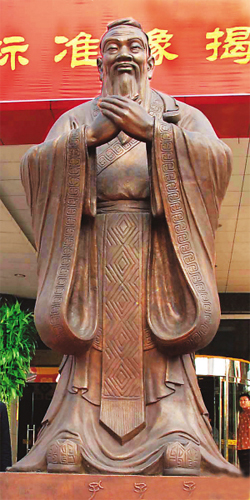
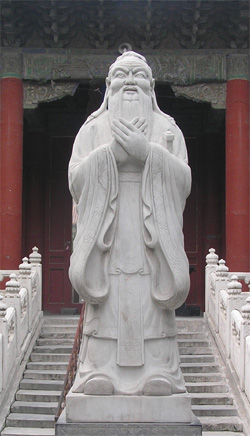
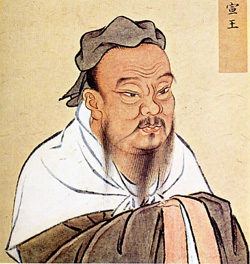
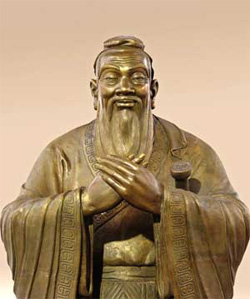
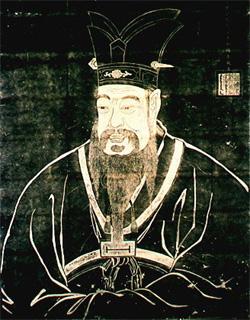
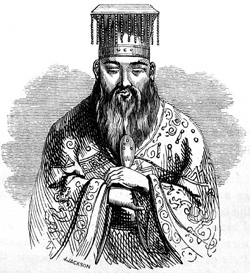
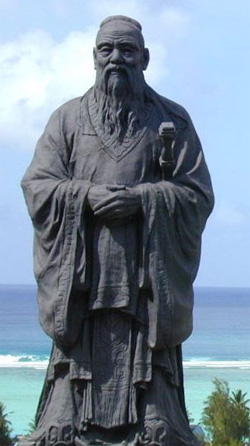
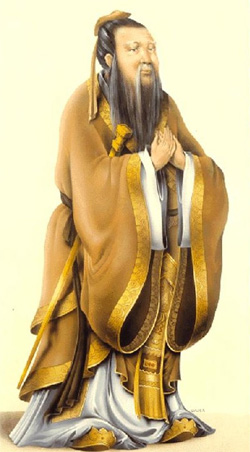
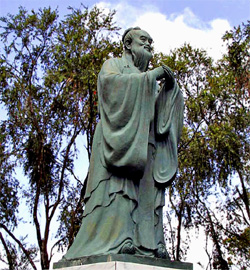
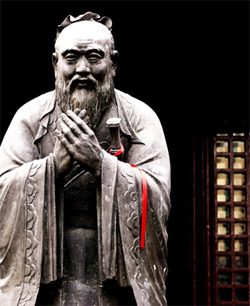
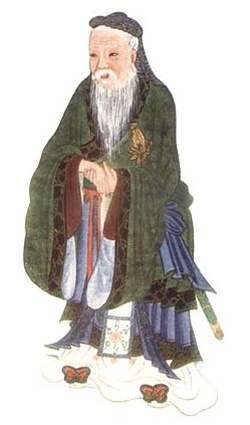
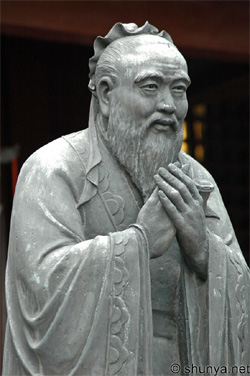
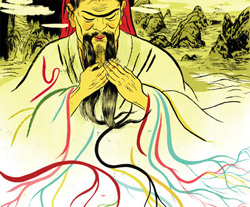
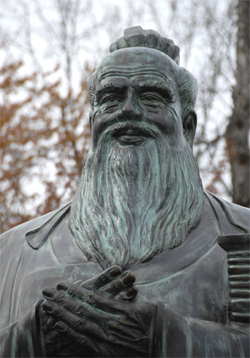
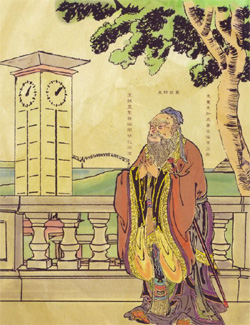
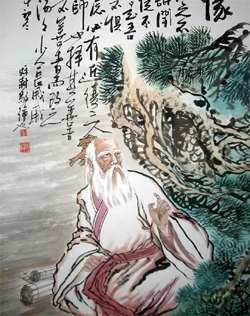
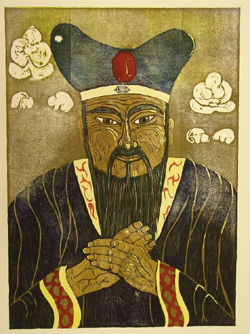
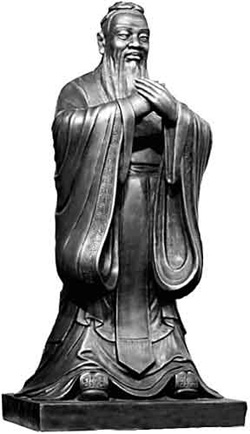
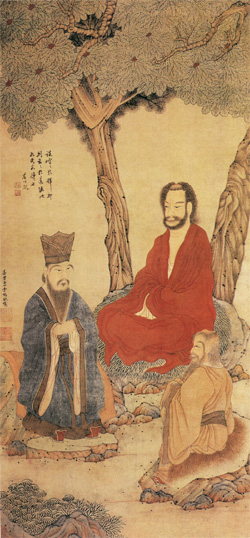
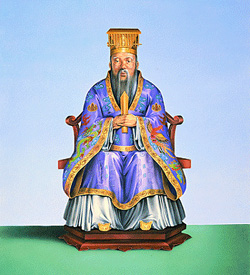
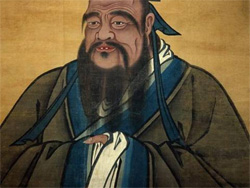
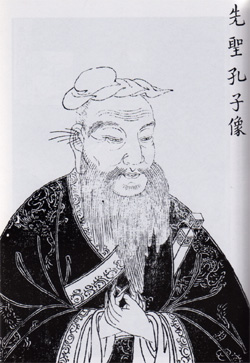
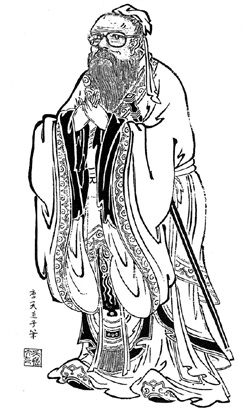
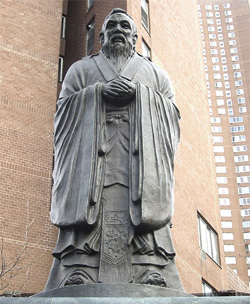
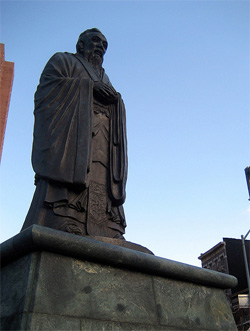
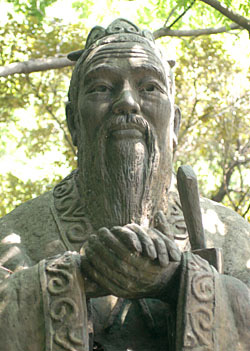
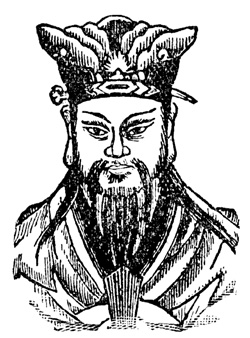
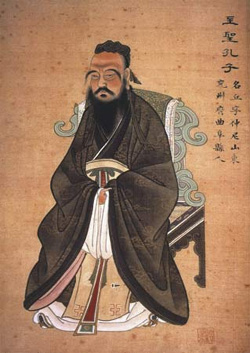
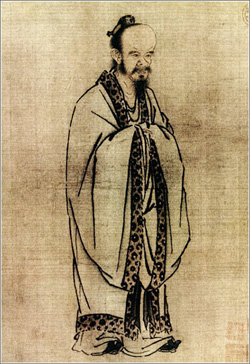
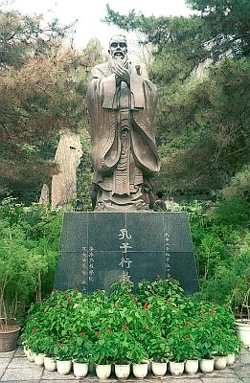
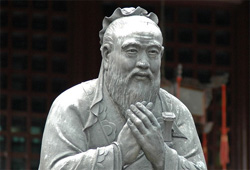
|






















































